Build a Career You'll Love
Yacht engineer salary in the united states.
How much does a Yacht Engineer make in the United States? The salary range for a Yacht Engineer job is from $76,062 to $103,414 per year in the United States. Click on the filter to check out Yacht Engineer job salaries by hourly, weekly, biweekly, semimonthly, monthly, and yearly.
- Per semimonth
- Connecticut
- District of Columbia
- Massachusetts
- Mississippi
- North Carolina
- North Dakota
- New Hampshire
- Pennsylvania
- Rhode Island
- South Carolina
- South Dakota
- West Virginia
- San Francisco, CA
- Washington, DC
- Chicago, IL
- New York, NY
HOW SHOULD YOU USE THIS DATA?
Employees: Use this as a guide for salary expectations, but be aware that responsibilities can change across companies for the same job title, so there may be differences between this data, other free site and our subscription products bought by employers.
Employers: This data could be used as reference point in your market pricing, but not the only source, due to differences across jobs locations, and sizes of companies.Consider additional sources like our Employer reported data.
Our consulting team crafts efficient, data-driven solutions using the power of CompAnalyst ® , ensuring your challenges are met head-on.
The trusted data and intuitive software your organization needs to get pay right.
Let our management tool - JobArchitect™ streamline your job description process. Say goodbye to the hassle of crafting job descriptions.

Highest Paying Cities for Yacht Engineer in the United States
States with higher salaries for yacht engineer, how much do similar professions get paid in the united states, how much should you be earning, what does a yacht engineer do.
According to the Safety of Life at Sea (SOLAS) convention, it is the responsibility of the Yachts Chief Engineer to look after the safety of maritime professionals and other Engineers working in the engine room.
Holding an AEC certificate will allow you to be a chief engineer on a yacht over 24m and less than 200 Gross Tons or act as an assistant engineer on vessels over 200 GT up to 60NM from a safe haven.
The main role of a Yacht Engineer is mainly responsible for the safe and efficient running of the yacht.
These options may not offer you huge shortcuts when you start working towards becoming a yacht engineer, but they will provide you a knowledge base that is extremely beneficial as you advance.
On some yachts, there may also be a duel-deck engineer to help out with the deck and engineering jobs, and apprentices can even be hired in some instances.
View Job Skills and Competency Data for more than 15,000 Job Titles, 18 Industries, and 26 Job Families.
Most Common Benefits for Yacht Engineer
Related companies for yacht engineer in the united states, frequently asked questions, do i receive fair pay as a yacht engineer currently, what are the responsibilities of a yacht engineer, how much do similar jobs to yacht engineer make.
- Yacht Captain
- Yacht Manager
- Yacht Designer
- Yacht Broker
- Yacht Sales
Where can I get a higher Yacht Engineer salary in the United States?
What is the yacht engineer's salary range in the united states, career insights.

Lighthouse careers
- [email protected]
- +33 451 088 780
- Calculate your salary

Yacht engineer salary and job description
According to an article published in 2021 from MTU, engineering jobs are once again one of the highest paying careers on the market, and for great reason!
Engineers endure years of intense studying to achieve their degree, making them among the most responsible and hard-working individuals in the job market. One of the many benefits of an engineering career is that you are not confined to a cubical setting. Have you ever considered working on a yacht?
But what does a yacht engineer do, and how much does a yacht engineer make?
Guests board yachts to take them to exciting destinations and see corners of the world that others only dream of. Read on to learn why yacht engineers are one of the most sought after positions on the market today!
You can also check out this link to skip ahead and view some of the available yacht engineering positions available in your area!
Yacht Engineer positions
Before determining how much a yacht engineer makes, it is necessary to break down and understand the qualifications and responsibilities of the different types of engineers.
Also, it is crucial to remember that the pay of each yacht engineer position will vary based on several factors, including vessel and engine size, itinerary other requirements linked to the safe manning of the yacht.
We aren’t really used to this, right? Many career fields on land have general pay scales that you can use to compare positions, say, in different cities or with competing companies.
At sea, the numerous factors involved make it difficult to pinpoint an exact yacht engineer salary that will apply to every position. However, this article will provide you with the latest figures and research to give you an accurate idea of what to expect.
This way, you can plug in your own numbers and have a reasonably precise idea of how much dough you’ll be reeling in per month.
Without further ado, let’s jump right into the most common yacht engineering positions you would find sized on any vessel.
Chief Engineer
If the captain of a yacht is considered the brain, think of the Chief Engineer as the heart.
Much like our brains, Captains ensure that every aspect of the operation is working seamlessly and coherently to ensure smooth sailing.
Similar to how brains need blood and oxygen to ensure smooth running, Captains need their Chief Engineer to help oversee mechanical operations and keep the vessel running in tip-top shape.
The Chief Engineer reports directly to the Captain and, depending on the yacht size may also lead his team of engineers below. Regardless of the size, it is the Chief Engineer’s responsibility to ensure the vessel is up to industry standards in regards to all maritime regulations.
One critical aspect of the Chief Engineer’s job is to ensure that the vessel will pass all of the necessary flag and port inspections. To learn more about what to expect, click here and view the Ultimate Guide to PSC Inspections on Ships!
A failing grade may result in the detainment of the vessel, which is probably one of the worst things that could happen, especially with guests on board who are dreaming of their next destination. Engineers must be able to see problems before they arise. Proactivity is key!
The Chief Engineer aboard a yacht helps to keep things running efficiently, and on smaller vessels, their responsibilities will also include those of the Second Engineer.
Second Engineer
As their name suggests, Second Engineers are typically second in command. They report directly to the Chief Engineer. In certain instances, it may be necessary for them to step in as acting or temporary Chief Engineer. They must be familiar with and able to adequately perform the same duties.
On larger vessels, the Second Engineer may be the main supervisor for any Junior crew members under them, such as a Third or Fourth Engineer.
The day-to-day requirements of Second Engineers can vary, so this position is full of excitement and new schedules!
Therefore, all Engineers must be flexible. They could spend hours working in the engine room on one day, then spend all day the next helping out with difficult guest situations.
Yacht Engineers spend the majority of their day working to prevent issues before they happen. Active thinkers who can quickly assess difficult situations to find the best solution possible are great candidates for yacht engineering positions.
Both Chief and Second Engineers could be hired for permanent positions, on a rotational contract, or even on a temporary basis to cover for leave or a crossing or yard period for example. But what does that mean for your salary?
How Does a Rotational Contract Affect Pay?
In short, you will be paid less if you are in a rotating position as opposed to being permanently hired in the same role. However, many crew members would argue that the benefits of being on a rotation far outweigh the difference in pay.
It’s no surprise that working on a yacht can provide its fair share of challenges, especially in regards to one’s personal life. Being out at sea decreases your time with family and friends.
Rotational contracts are typically 2:2, or 3:3meaning one month at sea then one month on land (or three months at sea, etc). Increasingly we are seeing 10 weeks on/off rotation so that crew are not always working the same months of each year. This is often the preferred option because it provides you with the best of both worlds: you’re able to have a well-paid job, while also cherishing irreplaceable family time.
Most yachts over 50m now offer full rotations for the chief engineer, and increasing for the second engineer positions. This is good news for the industry, as the engineers can transition entirely behind the scenes. Guests aboard the yacht will have no idea that the new team is in place, and that is crucial to a smooth transition!
This rotation also dramatically decreases the number of crewmembers who burnout from being at sea for so long. In the long run, rotating crews are often beneficial because they lessen the need to go through the hiring process every six to twelve months if permanent crew members decide to head back to land. This can be costly in every sense of the word.
How Much Does a Yacht Engineer Make?
Yacht engineer salary grids.
Above 50m, the Chief Engineer contracts are generally Rotational . The breakdown of their salary per month is below:
On yachts above 50m, crew may be offered Permanent Second Engineer or Rotational Second Engineers contracts. The average monthly salary for yachts from 50-90m for Permanent Second Engineers is as follows:
Finally, the average monthly salary for Rotational Second Engineers on vessels above 60m is as follows:
As you can see, rotational positions can be paid a similar salary to their permanent counterparts, however this will always be dependent on the certificate requirements and specific yacht and itinerary information. To learn more about this unique option, check out this informational article!
Necessary Background Experience
The ideal Yacht Engineer should have experience working on a charter at sea. Similar sized vessels to the open position will probably be preferred and set candidates apart from the competition.
They ought to display high levels of attention to detail and problem solving, as well as being able to plan and maintain an organized and efficient workspace.
Being prepared for any possible scenario is the backbone of a successful yacht engineer. Situations often arise that will need to be handled with poise and efficiency, and the best applicant will have experience keeping a level-head in these tough scenarios.
Again, a history of leading proactively looks great on the job application.
There are various pathways open to become a marine engineer. You can either complete an engineering cadetship through your national Martime School or go down the more specific yachting career path. In this case the MCA in the UK and the USCG in the USA are the better known ones.
Need a Yacht Engineer?
Whether you are inquiring about a position for yourself or hoping to fill a position on your yacht, you may have further questions, for example, just how much does a yacht engineer make?.
Don’t worry, you’re not alone!
Lighthouse Careers provides you with the tools and assistance you need to put together a crew you will be proud of. Take a few moments out of your day to submit an inquiry , and hear back from talented professionals ready to step on board!
We also make it easy to find your dream a position aboard a yacht. Register your application with us so that we can match you to employers and yachts that fit your needs!
When you’re ready, we’re here waiting to help you succeed!
Recent Posts

What Makes A Good Yacht Engineer?

New Year New You – Tips for Keeping a Healthy Lifestyle Onboard

R is for Rotation

5 Essential Qualities of a Successful Yacht Yoga Instructor

The Importance of Menu Planning for yacht chefs

5 Qualities to Look for When Hiring a Yacht Masseuse/Beautician

How to Find the Right Purser a luxury Yacht: Tips for Hiring

Moving up too Quickly……
Our mission.
We strive to be the first-choice recruitment service provider for both clients and candidates alike. Our goal is to make the recruitment process as smooth and seamless as possible

- Browse jobs
- Affiliates/PCCP
- Looking for crew
- Looking for staff
- Mission Statement
- Blog articles
- Baya, Building 7 400 Avenue Roumanille Village d’Entreprises Green Side BP 309 06906 Sophia‑Antipolis
© 2023. Lighthouse-careers
- Yachting for beginners
- Owning a yacht
- Motor Yachts
- Sailing Yacht
- Indian Ocean
- Mediterranean
- Buying or Selling a Yacht
- Yachting Events
- FAQ – Luxury Yacht Charter
- FAQ – Buying a Yacht
- FAQ – Sell your Yacht
- How Much Does It Cost To Charter A Luxury Yacht?
- All our Blog Post & News

Yacht crew positions : Hierarchy, Missions & Salaries explained
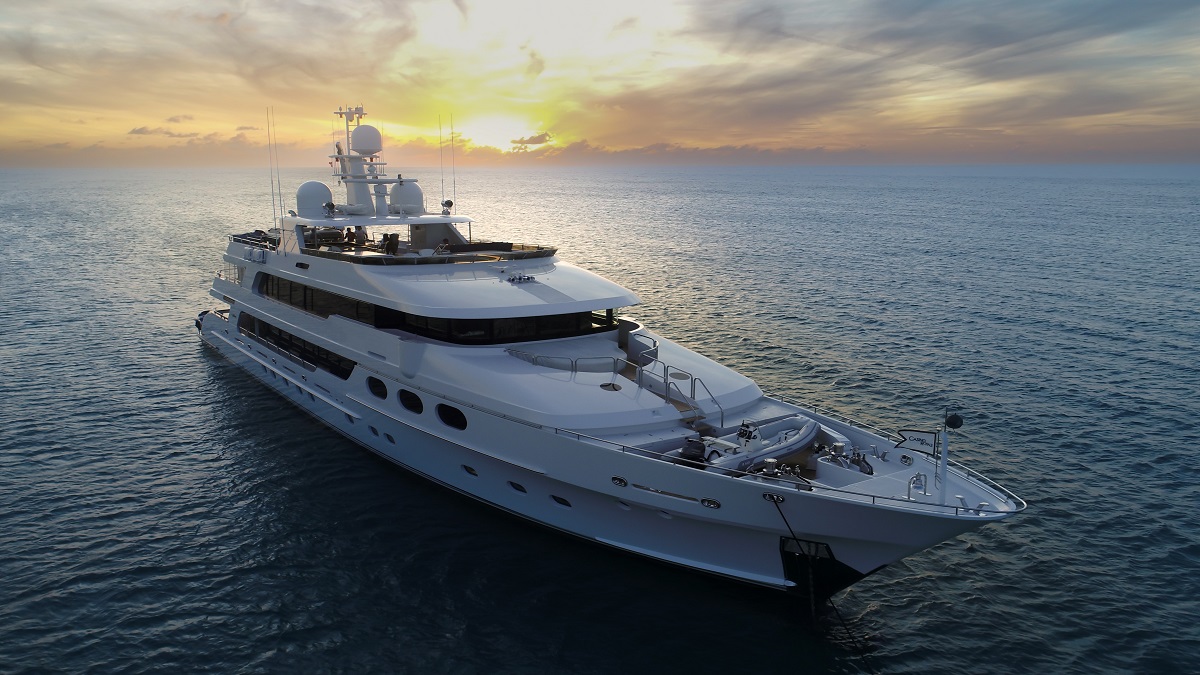
Like any well-run hotel, restaurant, or other luxury service, a crewed yacht needs organized structure and good management. Whether you’re staffing your own luxury vessel or looking for an exciting career working and traveling the world, you need to know how this structure works, and what you can expect to pay or earn and do in the various roles on board.
Every yacht is a little different, and organization may reflect the style of the captain or the demands of the owner. But the same jobs need to be done on almost every boat. Organized with ranks, heads of each division report to the Captain. It’s not a military-style organization, but there are parallels with merchant marine grades and structures.
Smaller yachts need fewer crew, and staff may wear multiple hats that cross more traditional divisions and may combine some jobs with others. Large yachts have more distinct divisions or subdivisions, with more specialization to divide tasks and manage staffing. The core skills are the same, but finding staff with the right blends to do the jobs is key. Crew with broader skills are highly sought after.
As a yacht owner, you shouldn’t have to worry about day-to-day management decisions or organizing all this. That’s why you have a captain, and it’s better to leave staffing decisions entirely up to him or her. But it’s still important to know what it is people you’re hiring do, why they’re there, and how many you need. You don’t want too many crew, or to be short-handed. An understanding of what your yacht needs helps you talk to the captain to keep your yacht running how you want it.
For those looking to break into yacht crew work, consider your skills and strengths, and what jobs appeal to you. You’ll need training before you work, and you can direct your job path through the training you seek. Your goal is a suitable position on a well-run yacht, so make yourself the most attractive candidate possible.
Yacht Work Life
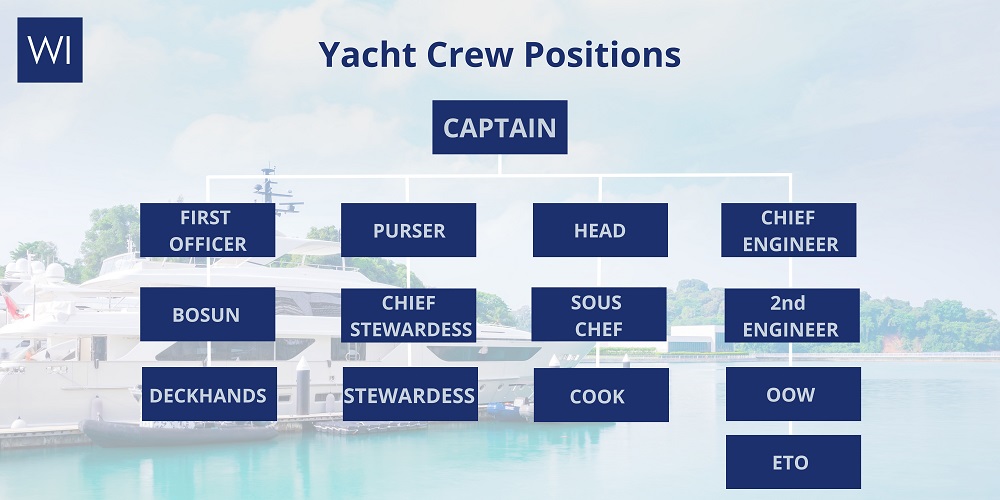
Working on a yacht is also living on the yacht. Crew must have a space to sleep, food, and all the basics that any employee needs. Large yachts have space reserved for crew, and owners looking for quality crew should provide good working and living conditions. Your crew takes care of you, and you should take care of them.
Depending on where a yacht operates or what flag she flies, a variety of labor laws or rules may be in effect. These requirements may be for work visas, contracts and written agreements, and compliance with merchant and ship crew treaties and laws. Be prepared to have work and non-disclosure agreements between yacht and crew, though a few yachts skip this.
Seasonal Jobs
Many yacht positions are seasonal. Year-round employment is more likely for senior crew like the captain and department heads, but not all yachts see year-round use. And some yachts may use different crew in different locales between seasonal moves.
Any job listing should give seasonal information, with geographic information, the length of the season, and the prospects for year-round positions and repeat employment.
Hours, Salaries, and Expectations
Yacht crew is a service job at its core, and every yacht owner is looking for service-oriented people who understand how to deliver a hotel-quality living and restaurant-quality fine dining. Work experience in luxury hotels and restaurants is a big plus for some jobs, and makes breaking into yacht work easier.
Yacht work can be very demanding, with periods of intense work when the owner and guests or a charter party is on board. Long days aren’t uncommon, but often balance with slack time when the boat is empty of passengers. There is always work to be done, but there’s usually a chance for time off.
Most salaries are monthly, since many positions are seasonal. Pay ranges are commensurate with experience, rank, and responsibility. Private vessels usually offer higher base pay, as charter crew can earn tips on top of their base salary. Because of the demands of the lifestyle, compensation is good and you have minimal living expenses on board.
Benefits and Time Off
Because so many jobs are seasonal and may occur in different countries and locations, benefits offered to yacht crew vary widely. But it is not uncommon for crew to be offered health and accident insurance and a flight to the vessel. Living on board, you’ll get food, rooming (usually shared), basic toiletries, uniforms, and laundry. Yachts with a longer view may offer additional training to long-term prospects.
Time off is usually linked to boat use, and may be sporadic in-season or when the boat has the owner and guests on board. There will always be some time off, but it may be between very intense work periods.
Most crew jobs have an employment contract that meets the Maritime Labour Convention 2006 (MLC). This should spell out the contract period and duration, as well as salary, leave and time off, probationary periods, repatriation policies, and any other crucial details to meet the minimum international standards of crew welfare.
This contract should also contain shipboard policies on confidentiality and non-disclosures, drug and alcohol use on board, personal hygiene expectations, interpersonal relationships, and dispute resolution. Job expectations and requirements can also be included, with specific language about roles, tasks, and cooperation between divisions.
Note that all crew agreements will explicitly prohibit drug use on board, most limit alcohol consumption and ban hard liquor on board, and many boats have policies prohibiting intimate personal crew relationships. Because the crew is living on board full time and in close quarters, rules to maintain decorum and crew harmony may be in writing.
Training & Certificates
Two key certifications are required for yacht crew. Employers look for the STCW (Standards of Training, Certification and Watch-keeping for Seafarers) and the ENG1 (Seafarer Medical Certificate). Insurers generally require crew to have these two certifications or the equivalent.
The ENG1 isn’t a class. It’s a medical exam to ensure that the crew is physically fit to serve at sea and has no underlying conditions that may arise far from help. It’s best for prospective crew to secure the ENG1 before investing more time and money training.
STCW is a week-long class on the basics of onboard safety. This includes hands-on modules covering personal survival, fire safety, first aid and CPR, accident prevention, and security awareness. It needs to be refreshed every five years.
Shared, Hybrid, and Crossover Jobs
Larger vessels will have more defined duties and specific areas of responsibility. But smaller yachts may want the crew to have different roles in different situations. For example, a hybrid job description may read “3rd Engineer/Steward” and describe a role in engineering when the boat is empty but on inside crew when passengers are on board.
When hiring or seeking jobs be prepared to look for creative crossover skill sets to meet the needs of the vessel.
Extra Skills and Duties
Any extra skills outside the regular duties makes crew more attractive. From stewards who can teach yoga, give massages or play cocktail piano to deck crew who know how to water ski, SCUBA dive, or fish, anything that crew can bring to enhance the passenger experience adds value to the employee.
If you’re looking for a position, list the skills you’d be comfortable using. If a vessel owner is looking for something specific, spell it out and figure out how that special duty fits into the employee work day.
The Four Main Divisions

Most yacht crews break into four primary divisions which group related tasks and responsibilities together. While the grouping sounds like it’s by section of the boat, they’re really more functional. For example, stewards (Interior) will definitely serve meals, whether they’re in the main dining room or out on deck. Deckhands (deck) are going to be involved in painting, sanding, and varnish jobs anywhere on the boat.
The deck crew handles most of the exterior operations of the yacht, and runs it. Deck hands and crew keep the boat looking clean and shiny, and handling most vessel operations. This includes driving and operating the yacht, navigation, running all launches and ship’s craft, handling lines, and all maintenance and painting, washing, and shining.
2-Interior (or Inside)
Inside crew are primarily the stewards and housekeepers. Larger vessels will have a dedicated housekeeping staff separate from the stewards, but smaller vessels may not.
Stewards keep the interior clean, do all housekeeping, laundry, food and beverage service, cabin preparation, and anything else needed for the comfort of the passengers.
3-Engineering
Below decks, the engineering department ensures the safe and smooth running of all the ship’s machinery and electronics. Engineers are engine and systems specialists, and there will usually be a dedicated electronics expert. Most engineer jobs require professional training and certification.
Fine dining is a hallmark of the yachting experience, and a full-time galley crew prepares all meals for passengers and crew. The head chef plans the menus and provisions the boat, while junior chefs assist the head chef with meal preparation and keeping the galley spotless.
Yacht Job and Department Details
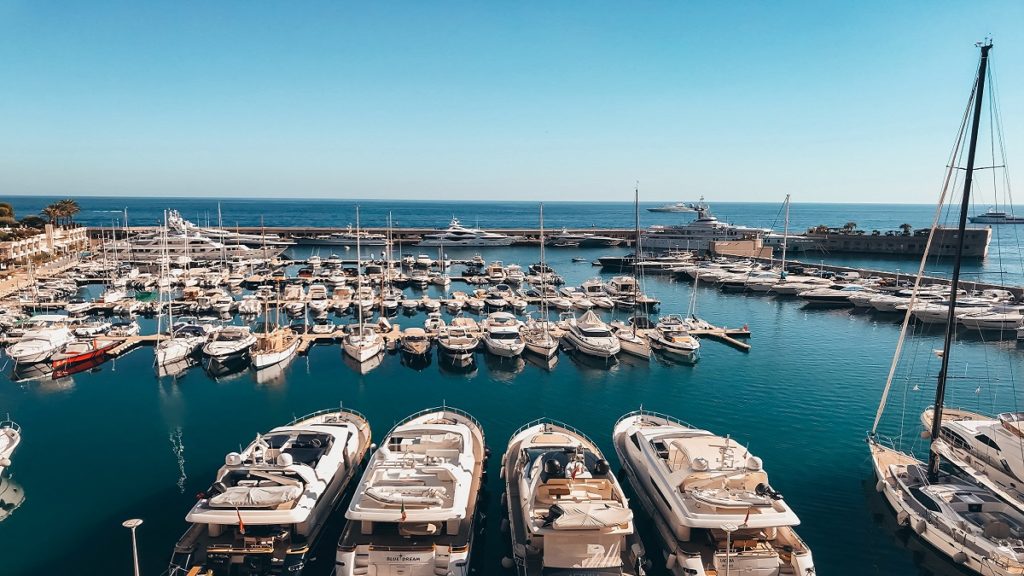
Departments are all organized in a hierarchy, with a department head reporting to the Captain. The clear chain of command makes for smooth operations, with all communications going up and down ranks. Junior staff will occasionally take instructions from other divisions as all crew is expected to help as needed. A captain or department head may organize staff differently, so reporting structures listed are guidelines only.
All salary ranges are monthly figures and are ranges based on yacht size and crew experience. Senior jobs on larger yachts have more responsibility than the same job title on yachts with smaller crews. Experienced crew are very desirable and can expect more pay for their positions.
Listed responsibilities are not exhaustive, and different yachts may allocate some jobs to different positions.
Read also: The yacht charter experience ladder
The Captain

The captain of the vessel is the overall decision maker for the yacht in all situations, including the safety of the vessel. The owner should leave the Captain responsible for operational decisions about hiring and staff and operating the ship. To become a captain requires years of experience and training, and a broad set of skills including yacht operations, personnel management, budgeting and finance. The captain works directly with the owner and owner’s representative, if the captain is not also acting as the representative.
On an organization chart, the Captain is usually placed in the deck division, but the Captain is always the senior-most crew on the yacht and all division heads report to the Captain.
Responsibilities include:
- Responsible for all navigation and running the yacht.
- Senior decision maker on all crew hiring.
- Manage repairs, refits, and yard work.
- Manage budgets and accounting. On larger yachts, this task ends more on the Purser, but the captain is always responsible.
- Ensure all paperwork, clearances, and legal requirements are completed.
- Primary contact with the owner or charter parties.
Reports to: The yacht owner
Salary Range: $6,000 to $22,000
The deckhands handle all the outside responsibilities of the ship, including cleaning and maintenance of the yacht and all the ship’s vessels and toys on board. Deck crew will have significant contact with passengers in this role, operating launches and delivering guests to and from shore and handling the toys.
All deck crew have watch responsibilities on passage, and daily responsibilities keeping the yacht pristine and clean. They will also do line handling and secure the yacht.
Deck department : Chief Mate/First Officer
The Chief Mate or First Officer is the second in command of the vessel, and left in charge when the Captain is not on board. The first mate has the requisite skills to stand in for the captain and run the yacht if needed and usually acts as the division head of the deck team.
The seamanship skills needed are similar to the Captain’s position.
- Primary safety officer for the yacht and all passengers and crew.
- Supervise and manage all operations on deck.
- Bridge watches on passage.
- Passage planning and navigation.
There may be additional mates on larger vessels, these 2nd, 3rd, etc. mates have similar responsibilities on rotation. But the first mate is senior and always second in command.
Reports to: Captain
Salary Range: $4,000 to $9,500 (First mate)
Second and more junior mates may earn $2,000 to $4,000
Deck department : Bosun
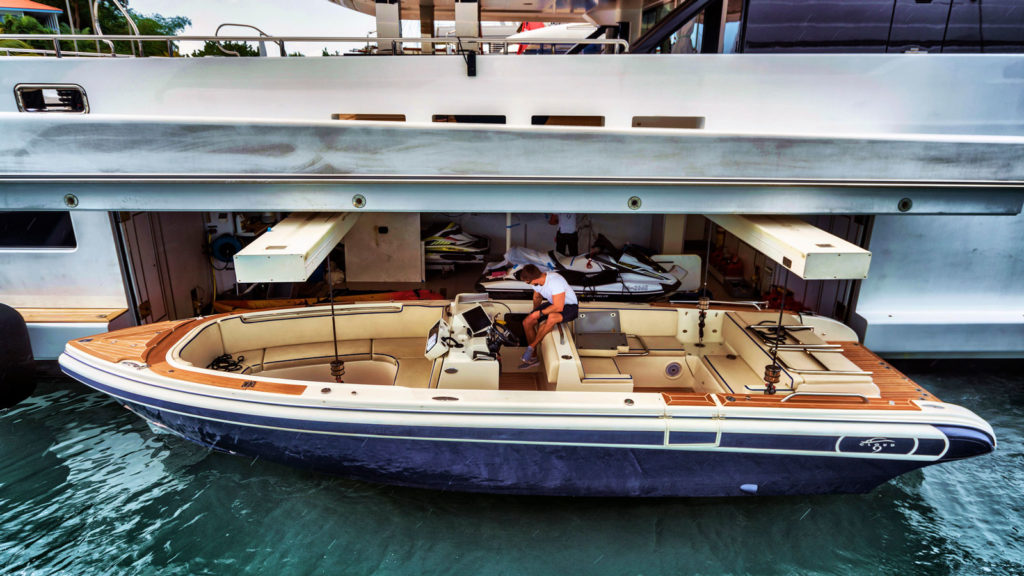
The Bosun is the senior deckhand and manages the junior hands on board. This will usually be the most experienced hand on board.
- Organizing all operations on deck.
- Coordinating the use, storing and launching of the ship’s boats, toys, and equipment.
- Managing the passerelle, watching passenger safety.
- Contact point for guest service on boats, toys, and trips to shore.
Reports to: First mate
Salary Range: $3,000 to $5,000
Deck department : Deckhands
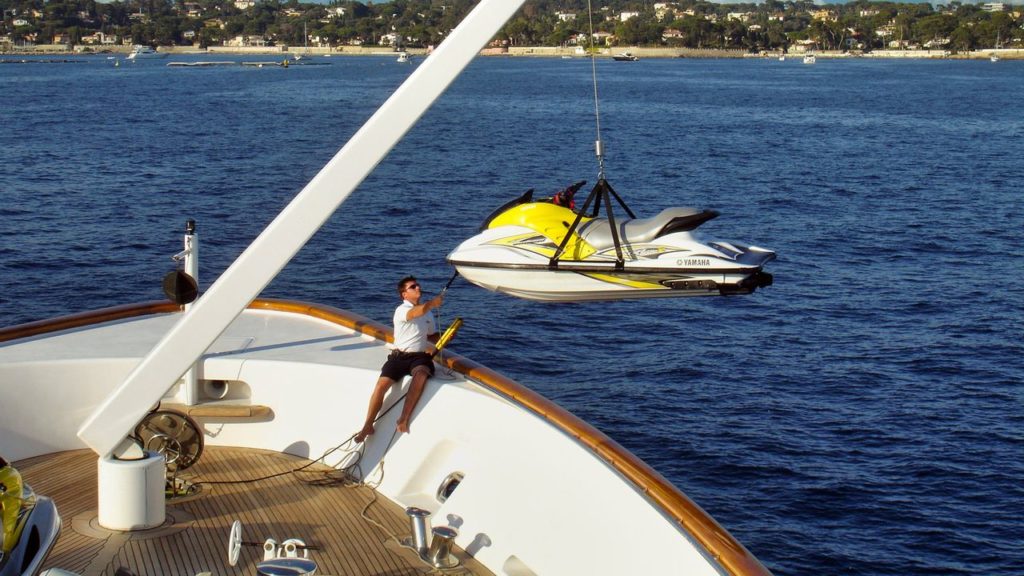
Deckhands are constantly busy with maintenance, cleaning, polishing, and assisting guests as needed. They will assist other departments as needed or given special duties.
- Daily cleaning of the yacht’s exterior.
- Painting, varnishing, polishing.
- Line handling.
- Launching and operating dinghies and tenders.
- Repairs and carpentry.
- Helping guests as needed – everything from handling baggage and gear to embarking and disembarking.
Reports to: Bosun
Salary range: $1,300 to $3,000
Though every position on a yacht is service-oriented, the interior or inside crew provides the primary customer service. They will interact the most with the passengers daily, and they’re directly responsible for the quality of their experience on board.
Interior department : the Purser

The purser is the chief financial officer of the yacht and handles all the financial operations on board. Accounting, purchasing, payroll and hiring, and all money matters end up with the Purser. This is a senior staff position, and may be the interior department head. Smaller yachts may eliminate the purser’s job and add it to the captain’s and other senior staff duties.
Responsibilities Include:
- Accounting and bookkeeping for all financial transactions.
- Human resources and payroll.
- Handling logistics for all departments related to purchasing.
- Managing contracts.
- Event coordination, including off yacht bookings and payments.
- Primary administration of the boat’s business paperwork.
- Inventory and supply management.
Salary Range: $4,000 to $8,000
Interior department : The Chief Steward/ess

The chief steward or stewardess has primary responsibility for all service roles inside. Food and drink service, cabin preparation, and anything to do with helping the passengers be more comfortable and enjoy their stay. The chief steward will be inside crew with several years of experience.
The chief steward manages the interior staff, setting and enforcing vessel service standards. The chief steward ensures the crew delivers a five-star hospitality experience.
Chief Steward Responsibilities:
- Scheduling and training junior crew for meal and drink service and cabin preparation.
- Primary contact with guests for meals and drinks.
- Sommelier and wine service.
- Coordinate with the galley for meals and presentation.
- Decorate the interior, from flower arrangement to table settings.
- Arrange onshore activities and outings.
Reports to: Captain or Purser, depending on the yacht
Salary Range: $4,000 to $8,500
Stewards/Stewardesses
The stewards and stewardesses are the primary guest service staff. They will work closely with guests and passengers, and have daily contact with them as they meet most of their needs while on board.
Steward Responsibilities:
- Food and drink service.
- Room preparation and turndown service.
- Cleaning, polishing, housekeeping, and inside maintenance.
- Cabin detailing.
- Laundry, pressing, and folding.
- Help with outings, trips, debarkations.
Reports to: Chief Steward
Salary Range: $1,500 to $4,500
Housekeeping

Larger yachts may have a dedicated housekeeping and laundry staff. This will be part of the inside crew, under either the purser or the head steward. There may be a senior housekeeper, if there are more than one housekeeping crew on board.
Responsibilities are the cleaning and laundry portions of the steward’s job, and a laundry steward may spend most of her time inside the ship’s laundry.
An experienced Head of Housekeeping may earn from $4,500 to $7,000, while a Laundry Steward typically earns from $2,500 to $3,500.
Read also: CAN OWNING A YACHT TO CHARTER (REALLY) BE PROFITABLE?
Food service requirements on any yacht are high. Whether it’s a privately owned vessel or a charter, the expectations are always for top tier food service, with a variety of meals planned for the requirements of every passenger. Chefs and cooks prepare all meals on board for passengers and crew, but sometimes other interior crew may help with prep work or cleanup.
Smaller yachts have smaller galley crews, but the largest vessels may have an executive chef and several sous chefs. All chef positions require formal culinary training and experience, but cook positions are often entry level. Promotion from cook to chef is unusual without additional training.
Galley department : the Head / Executive Chef

On larger yachts, an Executive Chef will run the entire galley with the help of sous chefs and cooks. With an Executive Chef, there’s an expectation that the food and menus will be on a level with Michelin star-rated restaurants.
The executive chef brings a thorough understanding of food preparation and presentation, and moves food preparation past creative up to artistic. Job responsibilities are similar to a chef, but the job demands and the required experience and education are much higher.
Salary range: $7,000 to $11,000

The chef has overall responsibility for all meals on the yacht, from provisioning in remote places to hygiene and good safety. If there’s only one chef, she’s the head of the galley crew. Finding the best provisions in far away locations and making the best of local food availability is a major part of the job.
- Planning a delicious and varied menu for passengers.
- Sourcing all food and arranging transport to the yacht.
- Maintaining and operating within the galley budget.
- Preparing passenger meals with professional presentation and style.
- Cleaning and maintaining galley and galley equipment.
- Deliver menus and meals on time, while running an organized and spotless galley.
Galley department : Sous Chef
The sous chefs assist the chef in all aspects of running the galley, and may have independent assignments to plan and guest and crew meals. While not primarily responsible for provisioning, the sous chef will help with food selection, menu preparation, and planning. A sous chef must have formal culinary training.
Reports to: Head chef
Salary Range: $3,500 – $6,000.

Galley department : The Cook
Cooks may be entry-level positions or experienced, but do not require formal gastronomy education. They will assist the chef and sous chefs, cooking meals and dishes for guests and crew, helping with provisioning, and keeping the galley neat.
- Assist with provisioning and buying high-quality food from local sources.
- Follow all food handling and safety guidelines.
- Assist the head chef as needed, taking direction and guidance.
- Prepare guest and crew meals as required.
- Staying on top of galley inventories and supplies.
Salary Range: $2,500 to $3,500
Engineering
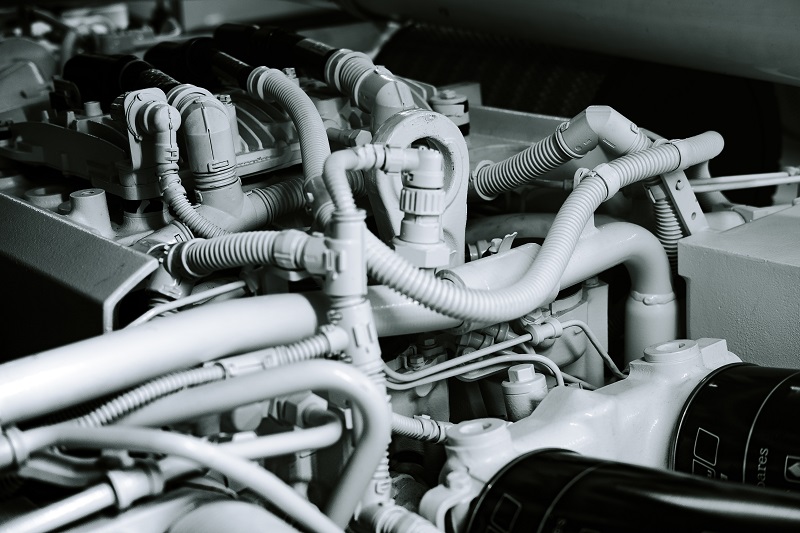
The engineering department keeps the yacht and all its systems working. Whether it’s the engines, electronics, air conditioning, or the plumbing – it’s up to engineering to keep it running.
There is considerable overlap with commercial shipping in the engineering field, as many of the same skills apply. And there is a broader range of qualifications and grades based on the size and power of the vessel. Job ratings may be set by required experience based on tonnage of ship or power of engines, with corresponding levels of pay and responsibility.
Unlike commercial shipping, engineers may get involved in other aspects of running the yacht, like helping with docking and water sports with mechanical toys.
Engineering certifications, training, ratings, experience and licensing are critical to hiring competent engineers, and for engineering crew it’s an important facet of career advancement. This is important for Chief and 2nd Engineers, which are often broken out by MCA (U.K. Maritime and Coastguard Agency) rating or other international equivalent.
MCA ratings for engineers Commercial and Private Yachts over 24m are:
Y4: Less than 200 Gross Tons and less than 1,500 kW engine power Y3: Less than 500 GT and 3,000 kW Y2: Less than 3,000 GT and 3,000 kW Y1: Less than 3,000 GT and 9,000 kW
There is also an unlimited rating for merchant vessels larger than the Y1 category. For discussing salary and responsibilities, we will include all ratings in one position description, but pay scales with the size of the yacht and any required higher ratings.
Chief Engineer
The chief engineer manages all aspects of keeping the yacht and its systems running. The chief engineer manages all the engineering staff, and directs all maintenance, repairs, troubleshooting and upgrades. This is a management position, but requires extensive hands-on technical experience and knowledge. Chief engineers on large yachts hold an MCA Y1 or Y2, smaller boats will have a lower rated chief and a smaller staff. Check Jooble.org to find abroad marine engineer vacancies.
- Provisioning, shopping, and stocking.
- Preparing passenger and crew meals.
- Following instructions and cooking under the direction of others.
- Galley cleaning.
- Follow food safety and storage procedures.
- Food pre-preparation.
Salary Range: $6,000 to $15,000
2nd Engineer
The second engineer is also a highly skilled position requiring a rating or license and several years of experience. This senior level engineer also needs knowledge of how to troubleshoot and maintain all yacht systems.
- Maintain and manage all engineering operations.
- Hire, train and supervise all engineers.
- Project manage all upgrades and retrofits, including managing budgets, contracts, and suppliers.
- Coordinate maintenance schedule for the entire yacht around the usage and seasonal schedules.
- Maintain costs and accounting for engineering operations.
- Design and handle all safety operations.
- Set and maintain standards for operations and cleanliness in the engine room.
Reports to: Chief engineer
Salary Range: $5,500 – $10,000
OOW (Officer of the Watch) Engineer
The OOW is a junior engineering position, but still licensed. There are two categories of OOW – MEOL (Marine Engine Operator License) and the more junior AEC (Assistant Engine Course). The overall responsibilities are similar, working to support the senior engineers and handle independent assignments. The AEC rating is entry level for licensed crew, but has training and certification.
- Support the chief in all projects.
- Maintain a clean, safe engine room.
- Perform all maintenance, troubleshooting and repair tasks as needed.
- Support motorized water sports.
- Occasionally assist with other vessel operations, like line handling.
Reports to: Chief Engineer
Salary Range, MEOL: $4,500 to $6,000 Salary Range, AEC: $2,500 to $3,500
Electronics/Technology Officer (ETO)
The ETO takes responsibility for all audio-visual and information technology on board. Ensuring passengers have access to the internet, movies, television, and music is a primary responsibility. This position carries a fair amount of passenger interaction, and an ETO needs good troubleshooting skills to go with customer service skills.
- Ensure all audio/visual and entertainment systems are always available for passengers.
- Assist passengers with personal technology and ship systems as needed.
- Conduct regular maintenance and upgrades of the network, information, and A/V systems around passenger schedules.
- Assist other engineers as needed, especially with electronic systems.
- Contribute as needed with other departments for boat and passenger operations.
Salary Range: $4,000 to $9,000
Junior Engineer
This is a lower or entry level position for someone with engineering skills but without formal licensing or certification. The junior engineer will help with safety and cleanliness, and assist in any engineering tasks as needed. The ability to solve problems and fix things opens this spot for anyone capable and willing to do the job.
- Help with cleaning, maintenance, and safety functions.
- Help anywhere needed on the yacht.
- Assist senior engineers as needed, taking direction and following instructions exactly.
- Constantly develop skills.
Read also: IS BUYING A BOAT A BAD IDEA?
Whether you are a yacht owner or considering entering this dynamic industry with an established and reliable crew, it is essential to have an understanding of the yacht’s hierarchical structure, mission priorities, and salary expectations. By doing your research on the complexity of yachting before hiring your team, you can confidently select the right group of experienced and qualified professionals for your needs. Staying up-to-date on top industry trends and knowing the capabilities of each type of yacht crew position will enable you to make sound decisions that support a safe and cost-effective journey. With quality personnel at your helm, you can cruise unhindered in luxury and explore new destinations with peace of mind.
Yachts in Below Deck: All Boats of the TV Show (& their Prices!)
What is the best country to register your yacht offshore, you might also like.

What differentiates a yacht from a superyacht or a mega yacht?
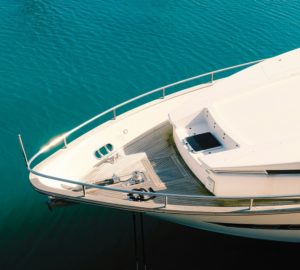
Chartering Requirements and Regulations: A Guide for Boat Owners

What are the Fastest Cruising Catamaran on the Market?
Role & Responsibilities of a Third Engineer at Sea
31 August 2023
Serving as the first line of defense in engine alarms and taking on an array of operational and maintenance duties onboard a ship, the role of a Third Engineer is both critical and demanding. In this article, we delve into the comprehensive range of responsibilities, necessary certifications, potential career paths, and the various challenges faced by a Third Engineer at sea.
Introduction to the Role of a Third Engineer
The maritime world is vast and complex, and the position of a Third Engineer is integral to the functioning of any vessel. The Third Engineer is typically responsible for watchkeeping, operating a ship's machinery, and maintenance duties onboard. This position often serves as the entry point for engineering officers and forms the backbone of the ship's engine room operations.
Operational and Maintenance Duties Onboard
Working as a Third Engineer on a cargo ship involves a multitude of tasks that keep the ship in prime operating condition. Key responsibilities include operating the main and auxiliary engines, purifiers, fresh water generators, and more. The Third Engineer is also accountable for managing one or two ratings, ensuring that the machinery is regularly inspected and that the ship's planned maintenance system is followed.
Depending on the type of ship, the Third Engineer may hold an engine room duty for 8 hours on and 4 hours off if the ship has a manned engine room, and 24-hour periods if the ship is of Unmanned Machinery Spaces (UMS) type. They perform maintenance work daily when at sea and are always ready to respond to any engine-related alarms or emergencies, making them vital to the ship's smooth operation.
Required Certifications and Training for the Role
To fulfill this role, a Third Engineer must possess a valid Engineer Officer of the Watch Certificate of Competency (CoC). Achieving this certification is a demanding task that requires a significant amount of study, including subjects ranging from physics and maths to practical marine engineering. To be eligible for this certificate, one must complete an approved training program at a maritime academy and acquire 12 months of sea time as an engine cadet. Alternatively, experienced ratings can also become eligible by completing 36 months at sea in an approved training program.
The requirements may vary by country. For instance, the UK requires seafarers to undergo a full week of additional training in human element and management, workshop skills like welding, and other aspects like abrasive wheel training. This rigorous process ensures that the Third Engineer is equipped with the skills and knowledge necessary to effectively perform their duties.
In addition to the CoC, the Third Engineer must also complete basic and advanced STCW (Standards of Training, Certification and Watchkeeping for Seafarers) courses. These courses provide comprehensive training in personal survival techniques, fire prevention and firefighting, elementary first aid, and personal safety and social responsibilities. The Third Engineer may also need to undergo specific training based on the type of ship they will be serving on, such as tankers.
Sea Time and Training for Promotion
A career at sea is marked by continuous learning and advancement. As part of this journey, the Third Engineer acquires extensive practical experience and develops their core engineering skills. The sea time required for promotion, coupled with a deeper understanding of the ship's systems and operations, prepares them for more senior roles.
For instance, 36 months of sea time as an Oiler can provide the necessary practical experience required to qualify for the EOOW tests, while 12 months of sea time as an Engine Cadet can lead to acquiring the CoC. Therefore, a combination of sea time and rigorous training forms the path to career advancement in this field. In addition, many companies provide training seminars to their Third Engineers off-contract, which can help them stay updated with the latest developments in maritime operations.
Professional Development and Career Progression
As junior engineers on a ship, Third and Fourth Engineers have a critical role to play in maintaining and operating a ship's machinery. This hands-on experience serves as a learning ground for developing core engineering skills. Additionally, this role provides a platform to understand the intricacies of the ship's systems and operations, which are crucial for career progression.
Third Engineers are considered the first responders to engine alarms and engage in essential maintenance work like cleaning diesel engine filters and overhauling purifiers. Such responsibilities provide a rich learning environment, and taking the initiative in these situations often equips engineers with the necessary skills for future roles.
Management skills also start to develop in this role. As a Third Engineer on duty, one is responsible for commanding the engine room personnel. Over time, these responsibilities and experiences pave the way to promotions, with the Second Engineer role being the next step. The Second Engineer position carries significantly more managerial responsibilities, making the experience gained as a Third Engineer invaluable.
Moreover, after gaining some sea experience, especially those with specialised knowledge such as naval architects, may find good opportunities ashore. Maritime academy graduates typically have to reach at least the Second Engineer rank to be considered for a role as a technical superintendent ashore. To learn more about the ranking structure, you can refer to our article on Ranks & Positions in the Engine Department of a Cargo Ship .
Daily Challenges and Work-Life Balance
The role of a Third Engineer comes with its fair share of physical and mental challenges. The daily schedule on a cargo ship at sea is demanding and can be physically and mentally exhausting. A typical day might involve waking up early, inspecting the engine room, attending toolbox meetings, doing maintenance work until late in the afternoon, and then standing by for duty, sometimes for 24 hours at a stretch.
In port, the engineers often stand by to operate any machinery required by the ship's operation. They keep watch during bunkering (refuelling) and operate the cargo pump system in 6-hour shifts if on a tanker. In the case of container vessels, port calls can provide downtime for maintenance work on the main engine.
The strain of work, combined with frequent alarms and emergencies, can disturb sleep patterns and cause stress. This combination of challenges makes work-life balance crucial for Third Engineers. While the work can be strenuous, companies are addressing this by offering incentives like shorter contracts to mitigate the seafarer shortage.
Leadership and Team Management Responsibilities
In addition to their technical duties, Third Engineers also have a significant role in leadership and team management. They are typically responsible for one or two ratings during their watch and are accountable for the safety and awareness of anyone working in the engine room. This responsibility extends to informing everyone in the engine room of any impending maintenance work that poses a hazard.
While the leadership skills required at this level are less than those required of a Second Engineer, they provide a strong foundation for future roles. Managing personnel and ensuring the safe operation of the engine room are key responsibilities that contribute to the ship's overall safety and efficiency. For more insights into ship safety, you can check our article on Safer Seas: Safety Advancements for the Shipping Industry .
Impact of Technology on the Role of a Third Engineer
Modern ships are equipped with advanced machinery, and this trend is rapidly increasing. From ballast water treatment systems to nitrous oxide management systems and scrubbers, these new technologies require a comprehensive understanding of their underlying principles for efficient operation. Third Engineers are often tasked with the day-to-day operation of these systems, and as such, they must stay up-to-date with industry advancements.
Conventional systems onboard ships also undergo changes from time to time, making it essential for Third Engineers to engage in continuous learning. Therefore, the role of a Third Engineer is not only physically demanding but also intellectually challenging. Balancing the practical skills needed to perform their duties with the theoretical knowledge required to understand and operate advanced ship systems can be a significant challenge for Third Engineers.
Role-Specific Risks and Emergency Responsibilities
The role of a Third Engineer includes several specific risks. These include overstressing due to the demanding nature of the job, lack of sleep due to odd working hours and emergencies, and working in hazardous areas, often hot and humid for extended periods. Moreover, these engineers are the first line of defence during emergencies, which adds to the inherent stress of the role.
In case of emergencies, the Third Engineer is often tasked with leading one of the engine room teams in firefighting or taking responsibility for starting the emergency generator and fire pump. In the event of an abandonment scenario, they may also be assigned the responsibility to start the lifeboats. Although these tasks seem simple, they require consistent training and preparedness to be performed under pressure. Our article on Navigating Maritime Emergencies: Ship Safety & Preparedness provides more insights into this area.
Compliance with Regulations and International Maritime Laws
As a Certificate of Competency (CoC) holder, the Third Engineer is held to high legal and professional standards. They are legally accountable for any pollution caused directly due to their decisions or incompetence. Hence, they must be well-versed in all job requirements and applicable regulations, especially those outlined in international maritime laws such as MARPOL and SOLAS.
Adherence to these laws is not just a regulatory requirement but also a matter of professional integrity. A breach can lead to severe consequences, both for the individual and the ship owner. Hence, a strong understanding of these regulations and consistent adherence to them is non-negotiable in the role of a Third Engineer.
Job Market Trends for Third Engineers
Unlike their deck department counterparts, Third Engineers are in high demand. The reason lies in the imbalance between the supply and demand of qualified professionals. Many maritime academy graduates find work at sea exhausting and opt for jobs ashore, which increases the demand for this role. Therefore, holding an EOOW CoC essentially guarantees a job in most countries.
Despite the challenges inherent in the role, the job market for Third Engineers remains robust. It is one of the most in-demand positions at sea, which implies promising job prospects for those willing to endure the demands and challenges associated with the position.
Salary, Shore Leaves, and Differences per Ship Type/Industry
The salary of a Third Engineer can vary significantly, typically ranging from 4000 to 7000 USD per month. This largely depends on factors such as the type of ship, the company, the nationality of the seafarer, seniority in rank, and the country that issued their CoC. For instance, specialised tankers like LNG vessels often offer the highest pay, while bulk carriers typically pay the least.
Our comprehensive guide on Seafarer Salaries provides more insights into the factors affecting seafarer earnings.
Shore leaves for Third Engineers are minimal, particularly on tankers. Work-life balance can be challenging as most companies offer only six-month contracts for Third Engineers, reserving their shorter contracts for their senior officers. However, to combat the shortage of seafarers, many companies are offering incentives such as three-month contracts for Third Engineers.
The role of a Third Engineer can also vary depending on the type of ship or industry. In the offshore industry, salaries are comparable to those in the merchant navy. On cruise ships, the role primarily involves watchkeeping as specialised teams handle maintenance. The position of a Third Engineer rarely exists on yachts, except for megayachts exceeding 90 meters, where a full engine department is necessary.
Liveseas' Role
Liveseas serves as a trusted platform for seafarers, particularly Third Engineers, connecting them with potential employers. Whether you're looking for a job or considering a shift to a different company, Liveseas can guide you in making informed career decisions.
At Liveseas , you can showcase your skills, gain visibility with potential employers, and connect with opportunities that match your career aspirations. Liveseas is a seafarer-first platform, ensuring that your needs and career goals are always our priority.
For those interested in starting a career at sea, we recommend reading our articles: How to Join the Merchant Navy or How to Start your Career on a Cruise Ship .
- ©2024 Liveseas
- All rights reserved.

The Quick and Easy Guide to Superyacht Engineering Careers
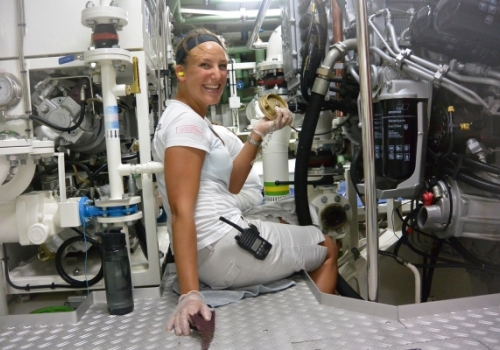
Following on from our guides on superyacht deck and interior careers, it’s time to get our technical hats on and lay out the career pathways for engineering, whether you’re transitioning from another sector or gunning for a chief engineer role.
As always, to keep us on track with the latest training requirements for superyacht engineers, we follow guidance from the experts at the careers guidance platform, Academy by Ephemeris .
What does a superyacht engineer do?
The role of a superyacht engineer varies depending on the size, type and usage of the yacht, and you might be working as a sole engineer, or as part of a team of six or more.
On smaller yachts you will be responsible for the operation, maintenance and repair of all mechanical, electronic, electric, hydraulic, pneumatic systems, and in some instances, also the structural systems and appendages on board.
Notably, on larger yachts there is usually a separation of function between the engineer and the electro-technical officer (ETO) who is responsible for the day-to-day maintenance and operation of all electronic, electrical, communications and audio-visual equipment. This could include radio, radar, telephones, satellite communications (including internet), navigation systems, email servers, TV, sound systems, and security equipment. We will cover how to get ahead on the superyacht ETO careers pathway in our next article.
How do I become a superyacht engineer?
There are two common routes for becoming a superyacht engineer. Firstly, you can enroll in the courses set out by the Maritime and Coastguard Agency (MCA) and work your way through them from the bottom up. These include the Approved Engine Course (AEC), the Marine Engine Operator License (MEOL), and the Yacht 4, 3, 2 and 1 qualifications (with Yacht 4 being the lowest of the four).
Before taking on the Yacht 4 qualification, candidates must already have the MEOL and AEC certificates, or hold an eligible amount of previous experience in another sector first, after which they can progress through the other levels. This is the ideal route if you are totally new to the industry and don’t yet have any practical experience.
The second route to becoming a superyacht engineer involves gaining a relevant qualification, such as a degree in maritime, aerospace or mechanical engineering, before embarking on your yachting career.
The advantage of this option is that you will have a degree under your belt if you decide to change careers later in life. The disadvantage is that it takes longer and will not necessarily offer you any shortcuts in your training to become a superyacht engineer.
What if I already have relevant experience?
If you already have a large amount of sea-service banked, non-yachting certificates or other relevant employment experience, you can apply to the MCA for a Letter of Initial Assessment.
The MCA will then assess the level at which you can enter the yachting certification process, so you can enroll for the relevant engineering courses, oral exams and ancillary courses to progress in your career.
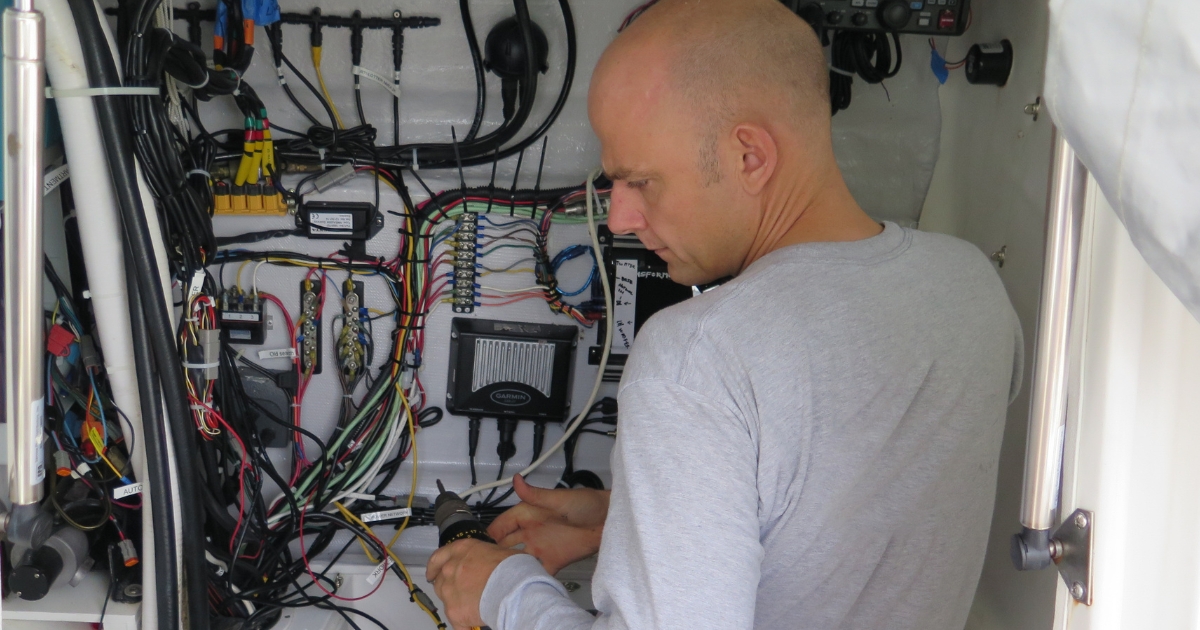
Which entry level qualifications will I need?
As for all crew working on board, to be a superyacht engineer you need to have completed your STCW basic safety training (a five day course) and have a valid ENG1 medical certificate. Assuming you follow the standard route into engineering, once you have both the STCW and ENG1, you will need to complete the AEC 1 and 2.
AEC 1 provides students with basic theoretical knowledge, as well as some practical hands-on experience of diesel engines/systems to enable you to meet the MCA’s requirements. This covers the basic operation of engines and their support systems, as well as checks and fault finding.
You can then progress to the AEC 2 course, which covers topics as diverse as refrigeration, legislation (books and records), maintenance systems and techniques, lifting and slinging, safe systems of work, electrical distribution, basic hydraulic systems, fresh water and sewage systems, and much more.
What are the different roles within the engineering pathway?
Although this varies depending on the needs of the individual vessel, the engineering roles on board a superyacht typically range from fourth engineer through to third, second, first and then chief engineer. The key difference between these positions is found in the level of leadership and management responsibility attributed to each role.
Fourth engineer As the most junior engineering officer on board, the fourth engineer is still learning the ropes, and you will need to demonstrate a willingness to learn and get stuck in straight away in order to succeed in this role. Chances are, you will be splitting your time between phases at sea and phases ashore to attend the courses necessary to progress in your career. Third engineer With responsibilities varying from yacht to yacht, the duties of a third engineer are diverse and could include the maintenance of lifeboats, tenders, toys, jet skis and deck equipment such as winches, davits, and hatchways, as well as interior maintenance. Second engineer Typically the deputy to the chief engineer, the 2nd engineer has responsibility for the maintenance of the engine room, often taking on more challenging repair and maintenance tasks, as well as supervising more junior crew members.
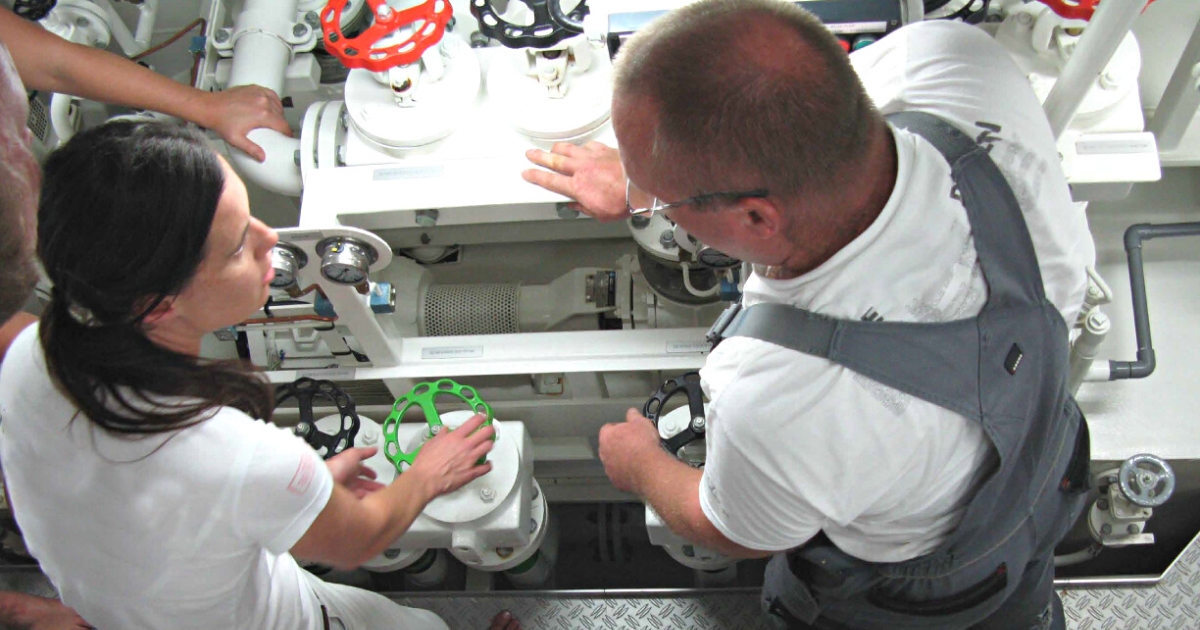
Chief engineer The chief engineer (often a sole engineer on smaller yachts), commands all engineering operations on board and will act as the senior advisor to the captain on all issues relating to the condition and serviceability of the engines, propulsion, ancillaries and interior systems.
Working closely with the captain to always ensure onboard safety, chief engineers are also responsible for maintaining compliance of the yacht’s systems and equipment with relevant laws and regulations to ensure that the vessel passes flag state and other surveys and inspections.
How do I rise up the ranks?
Progressing through the ranks requires you to apply for a certificate of competency (CoC) for each stage.
In order to qualify for the relevant CoC, there are various requirements for each role. These include attaining a certain amount of seagoing service, passing selected examinations (oral and written), and holding the applicable ancillary and safety course certificates. To discover the level of experience and exact qualifications required for each individual CoC, as well as other useful courses and qualifications to help you stand out from the crowd, visit the Academy by Ephemeris website and explore the engineering pathways .
A spokesperson from Academy by Ephemeris highlights: “The yachting industry is always in need of fantastic, tech savvy engineers. It is a fulfilling, challenging and stimulating career, and we are delighted to have helped scores of enthusiastic candidates to achieve their career goals by following the guidance laid out on our platform.”

Post your comment
You cannot post comments until you have logged in.
No one has commented on this page yet.
RSS feed for comments on this page | RSS feed for all comments
Search articles with keywords

Get Onboard
Superyacht Training
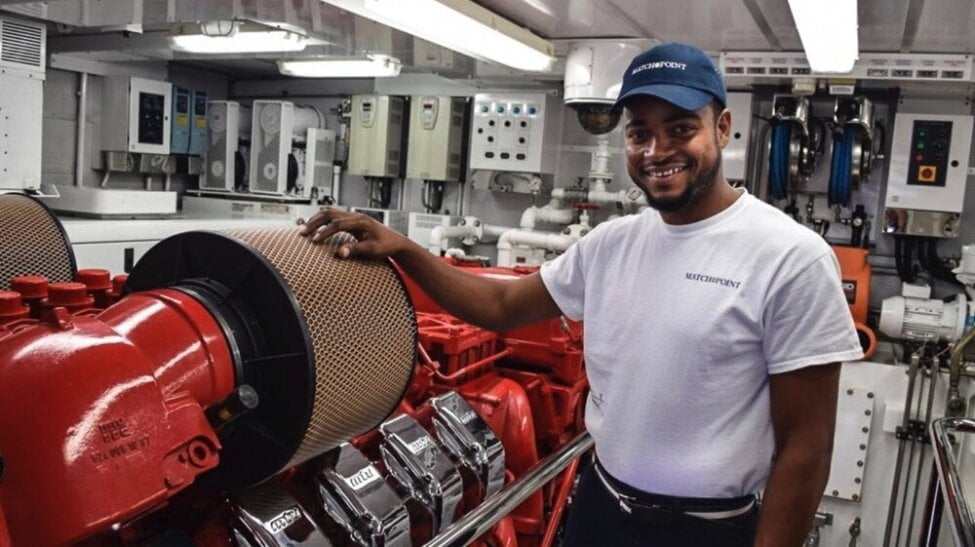
How To Become A Superyacht Engineer
Thinking about pursuing a career as a superyacht engineer we show you how….
We frequently receive emails from students asking us, “How do I become a Superyacht Engineer?” “Are my trade skills transferable?” “What yacht training must I complete?” and “ What qualifi cations do I need? “. In this article, we break down these questions and explain exactly what steps you need to follow in order to become a super yacht engineer.
What is a Superyacht Engineer?
The crucial part of any yacht engineer job description is maintaining the mechanical and electrical operations of the yacht. The duties of an engineer range from maintaining and servicing generators, jet skis and powerboats to replacing oil filters, repairing water makers, monitoring air conditioning, AV, IT and even unblocking toilets. Whether you are new to the industry, or have worked on land as a plumber, carpenter or tradesman, anyone can become a super yacht engineer, provided they have completed the necessary courses.
The Engineering Department onboard a super yacht is quickly becoming one of the most desirable departments to work due to the rotation packages as well as the transferable skills land-based skills such as plumbing and carpentry . Senior Engineers are highly respected and are of a similar rank to the Captain as the yacht is unable to manoeuvre without them.
What are the Superyacht Engineering Courses and Qualifications?
Yacht engineering qualifications were introduced in February 2001 to provide an industry standard system of certification. The system allows all those who wish to pursue engineering careers to do so, no matter what their previous training is.
The Maritime and Coastguard Agency (MCA), have set out the basic course progression you will need to follow in order to work your way up from a Junior Engineer, to Chief Engineer onboard. This involves completing the AEC , MEOL and Yacht 4, 3, 2 and 1 qualifications.
The qualifications you require include:
A mechanical, diesel or electrical background
Strong project management skills
Inventory maintenance experience
Understanding of different softwares
The Approved Engine Course (AEC) – the base minimum for superyacht engineers who wish to work on yachts over 24m LOA
The Marine Engine Operators Licence (MEOL)
Depending on the size of yacht you want to work on, you may need the following licenses.
– Yachts <200GT with up to 1500Kw in propulsive power:
Small Vessel Second Engineer (formerly Y4)
– Yachts <500GT with up to 3000Kw in propulsive power:
Small Vessel Chief Engineer (formerly Y3)
– Yachts <3000GT with up to 9000Kw in propulsive power:
Small Vessel Chief Engineer (formerly Y1/2)
or Officer of the Watch (Engineering) – usually gained from the commercial shipping industry
– Unlimited license:
Engineer Officer of the Watch – Unlimited
What is a typical yacht engineer salary?
Starting out as a 3rd or junior engineer, you can expect to earn anywhere from $3,000 to $6,500 per month, and as you move up the ranks to 2nd engineer this increases from $5,000 to $8,000.
In the top position, a chief yacht engineer salary can be anywhere between $8,500 to $13,500, depending on the size of the yacht, so if you want the big bucks then the engineering department is the way forward!
There is no average yacht engineer salary, with roles varying so much from yacht to yacht, however these figures are a guideline for what you can expect to earn. It is worth noting that obtaining your engineering qualifications takes time and is an expensive process, so be sure you are ready to commit to long hours of studying ahead. Check out our article on yachting salaries for more information.
What are the super yacht training package do you offer?
Once you have completed your STCW course and other basic safety training, you can look to expand your skill set to work on board in the super yacht industry.
We have put together an extensive Superyacht Engineering training program which is an ideal entry level introduction for those seeking to work on a yacht as an Engineer. Due to the longevity of the engineering department onboard, this is an excellent avenue to explore if you are looking for real career progression, rather than a gap year experience.
- Proficiency in Designated Security Duties (PDSD)
- RYA Powerboat Level 2
MCA Approved Engine Course (AEC1)

Interested in learning more?
If you are thinking about starting out as an engineer, you can read more about our Superyacht Engineer Course package.
You can complete these courses with us at Get Onboard Superyacht Academy in Cape Town. If you are interested in learning more, why not speak to one of our expert consultants who will happily answer any additional questions you may have.
Needing more?
Error: Contact form not found.
RYA/MCA Online
1. what are the basic requirements you need to be eligible to work in the yachting industry, 2. what is the stcw and why do i need it, 3. what is the eng1 medical certificate, 4. what land based experience will help me find a super yacht job, 5. what are the different departments onboard, 6. what crew training is required for me to work as a junior deckhand.
- Yachtmaster/Coastal Skipper Theory
- Yachtmaster/Coastal Practical
- Specialist Super Yacht Training Course (Deck Hand Training Course)
- RYA Power Boat Level II
- RYA Personal Watercraft Course
- RYA Competent Crew Certificate
- RYA Day Skipper Theory and Practical Certificates
- VHF Radio Operator’s License
7. What crew training is required for me to work as a junior stewardess?
- Stewardess Course
- MCA Food Safety Level 2
8. How do I book my training courses?
9. how do i get my first job on a yacht, 10. are these courses worth it, or am i just wasting my money, 11. will i get hired for my first job from south africa, 12. what is daywork, 13. what are the best locations to get a yacht job, 14. how much can a motor yacht stewardess or deckhand earn, 15. what are the negatives of working on a yacht, 16. what are the positives of working on a yacht, 17. is working on a super yacht for everyone, 18. what is the minimum age to work on a yacht, 19. is accommodation provided when i am completing my yacht training in cape town.

Yacht Crew Salaries: Complete Guide to What Yacht Crew Earn
It’s no secret that the impressive yacht crew salaries attract most people into the exclusive yachting world.
Junior deckhands or stewardesses can earn starting salaries of $3000 per month. With a few years of experience and some courses to back you up, this amount moves up towards $4000-$4500 per month!
In order to compile this superyacht crew salary guideline, I have taken 10 of the top yachting platforms and used all of their data, combined with my personal experience, to reach an average salary expectation for each position.
Table of Contents
How Much do you Make Working on a Yacht?

Yacht Captain Salary
- 20m-30m: $4000-$7500
- 30m-40m: $5500-$9500
- 40m-50m: $8000-$15000
- 50m-70m: $13000-$19000
- 70m+: $16500+
Requirements of a Yacht Captain
- Years of experience needed: 3-5 years of experience as Chief Officer/Mate and more than 5 years of experience as a Captain for larger yachts
- Minimum level of Qualification: 200ton licence which allows you to drive vessels below 200tons
The Captain has the highest level of responsibility onboard the yacht and hence they earn the most out of all the yacht crew salaries.
Captains are accountable for the overall safety of the yacht, crew members and guests.
They also handle daily operations of the yacht, guests, and owner liaison. They deal with management companies, port control, budgets, human resources, and many more tasks and logistics that make the job demanding and stressful.
On top of this, Captains are required to hold high levels of certifications depending on the size of the yacht they are driving.
Yacht Captain salaries can sky rocket with higher levels of qualifications.
If you are looking to become a Yacht Captain one day I recommend looking into the courses required so you can get started with licenses and sea time. It takes time to get there, but when you do it will be worth it.

Chief Officer Yacht Salary
- 30m-40m: $4000-$6000
- 40m-50m: $4500-$7500
- 50m-70m: $5500-$9000
- 70m+: $8000+
Requirements of a Chief Officer
- Years of experience needed: 3-5 Years
- Minimum level of qualification: Officer of the Watch
The Chief Officer is second in command to the Captain and is responsible for carrying out the Captain’s standing orders.
On smaller yachts, the Chief Officer is referred to as the Mate.
The Chief Officer is responsible for carrying out the safety duties onboard and assisting in the bridge with paperwork and navigational planning.
The Chief Officer is also responsible for leading and managing their deck team, ensuring crew are following their duties as well as managing the water sports and guest activities.
The salary of a Chief Officer depends heavily on the license held.

Bosun Yacht Salary
- Years of experience needed: 2-3 years
- Minimum level of qualification: Yacht Master Offshore
- A yacht Bosun salary can vary between $4000 and $6000.
Responsibilities of a Bosun
The Bosun is essentially the Lead Deckhand onboard. A lead deckhand salary on a larger vessel will be similar to that of a bosun salary on a smaller vessel.
This is an opportunity to step up from being a deckhand and gain some experience in a leadership role. This position is in place for larger yachts so that when the Officer is busy with bridge duties, someone is in charge on deck.

Yacht Deckhand Salary
Years of experience needed: 0
- Minimum level of qualification: None needed, however Power Boat Level 2 and Yacht Master offshore will put you at a great advantage
- Entry-level yacht crew salaries start at $3000 and can go as high as $4000/$4500.
Responsibilities of a Deckhand
A Deckhand is an entry-level role on a yacht.
You need to spend a few years (or less) as a Deckhand in order to learn and gain experience so that you can step up in the ranks and obtain your licenses.
This role will be very hands-on in maintaining the exterior of the yacht. Duties will include cleaning, polishing, varnishing, sanding, caulking, and any other maintenance work required.
Chief Steward / Chief Stewardess Salary
- 30m-40m :$4500-$5500
- 40m-50m :$5000-$7000
- 50m-70m- $5500-$8000
- 70m+: $7500+
Responsibilities of a Chief Stewardess/Steward
- Years of experience needed: 3-5 years
- Minimum level of qualification: Depending on the size of the vessel you may need courses such as Food Hygiene and Safety, Silver Service, WSET, or a Purser course
The Chief Stewardess or Steward is responsible for all the interior operations of the yacht .
They are responsible for managing the interior team, and ensuring the interior of the yacht is maintained to the highest standards. Besides cleaning and laundry schedules , this also includes provisioning for crew and guests, budgeting, accounting, and training of junior crew.

Steward or Stewardess Yacht Salary
- Minimum level of qualification: Depending on the size of the vessel you may need courses such as Food Hygiene and Safety and Silver Service
- Salaries start at $3000 and go up to $6000
Responsibilities of a Steward or Stewardess
A Stewardess/Steward is an entry-level position working within the interior of the yacht.
There are rankings within the interior (2nd, 3rd, 4th Steward/Stewardesses). As you spend more time in the industry, you will be promoted to higher ranks, and with that will come a better salary and more responsibility.
This role covers a range of tasks, including but not limited to housekeeping, laundry, bartending, table scaping, floral arrangements, serving, and hosting guests.

Engineer Yacht Salary
- 20m-30m: $4000-$5000
- 30m-40m: $4500-$6500
- 40m-50m: $6000-$8000
- 50m-70m: $7500-$11000
- 70m+: $9000+
Requirements of an Engineer
- Years of experience needed: 2-4 years in an engineering role onboard as Deck/Engineer or relevant land-based experience
- Minimum level of qualification: AEC
The Engineer onboard is responsible for all mechanical functioning and maintenance of the vessel. This is a very technical role that can pay well as you gain experience and obtain your licensing.
Yacht Chef Salary
- 20m-30m: $4000 – $5000
- 40m-50m: $5500 – $75000
- 50m-70m: $6500-$9500
Requirements of a Yacht Chef
- Years of experience needed: 3-5 years depending on previous experience
- Minimum level of qualification: Food Hygiene and Safety Level 2
The Chef is responsible for feeding the crew 2 to 3 healthy and sustainable meals a day. They are of course required to prepare meals for guests when onboard to the highest of standards.
In their day-to-day tasks, they will be responsible for their own provisioning of the galley, maintaining stocks, cleanliness, and hygiene of the galley.
The salary of the Yacht Chef varies depending on qualifications and experience.

Yacht Crew Salaries for Private vs Charter Yachts
There are two types of super yachts that require crew: Private and Charter yachts. The salaries for yacht crew differ slightly between the two.
Private Yacht
A private boat is owned by a single person or family who uses the yacht for their own purposes. They don’t charter it out and you can expect to have the same guests onboard for the duration of your contract.
The benefit of these programs is that you get to know your guests well so you may find it easier to manage their wants and needs.
You may also benefit from traveling to off-the-beaten-track locations as I have!
For yacht crew working on these private boats, you will usually not receive charter tips.
Charter Yacht
A charter boat is one that gets chartered out by guests. This operates as a business and also means you will have different guests for every trip.
If you work on a charter boat you can expect to receive charter tips at the end of each charter. These are usually 10%-20% of the charter fee!
Considering these tips can be anywhere from $2000-$5000 per week depending on the size of the yacht, charter boats offer great earning potential and can skyrocket your salary as a yachtie.

Hi, my name is Lisa, a Chief Stewardess in the yachting industry with 10 years of experience, as well as 8 years of hospitality experience prior to that. Being in the yachting industry has been a whirlwind of adventure, growth, challenges and some of the best experiences of my life, and I am excited to share my knowledge and experiences with all of you.
How to Write the Perfect Yacht CV [With Template]
A day in the life of a yacht stewardess.

Yachts for Sale
Selling a Yacht
Tenders & Toys
Recent Sales
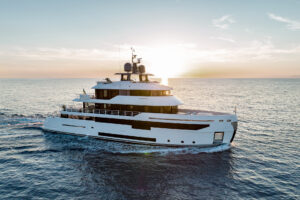
NEVER SAY NEVER AGAIN
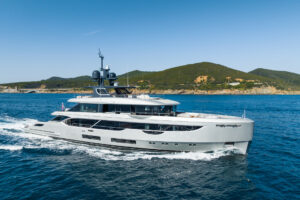
Yachts for Charter
Destinations
Experiences
Charter Management
Charter Guide
Yacht Marketing
How to Charter

Superyacht Management
Crew Structure

THE WELLESLEY
Superyacht Construction
New Yachts for Sale
Yacht Design
Yacht Shipyards
Custom Construction
Built on Trust

Heesen 55m Steel

Benetti Oasis
Yacht Shows
News & Blog

Yacht Engineer Jobs
A much-needed trained professional aboard any superyacht, a yacht engineer’s primary role is to oversee the safe and efficient running of a yacht. A mid-life position, a yacht the engineer will either work by themselves or can be in charge of an engineering department, depending on the size of the yacht. This department is tasked with maintaining both the mechanical and electrical operations of the yacht, from the main engines to the small onboard appliances. It is the responsibility of a chief yacht engineer to watch over the safety of other engineers in the engine room, as well as other workers within the department. Yacht engineers jobs are available on both privately owned yachts as well as charter yachts, which are rented out per day or week.
Yacht engineer jobs are extremely rewarding. Given you have completed the STCW Basic Safety training and have an ENG1, you can begin looking for a job as a yacht engineer today. Check out our entire yacht engineer job offerings for more information.
DUTIES AND RESPONSIBILITIES
A yacht engineer’s daily tasks include ensuring all equipment is maintained properly and is in safe working conditions at all times; overseeing the yacht’s communication equipment; and making sure all engineering work is done correctly. This includes keeping relevant documents and logs up to date such as the Engine room Log, managing the disposal of oil, Blige water and sludge from the yacht and carrying out watch duties. The exact day-to-day job description of a yacht engineer varies per yacht, type and size of the yacht.
YACHT ENGINEER SALARIES
Yacht engineer salaries vary, depending on the size and types of yacht. Data indicates that working on a charter yacht can see a yacht engineer earn more than on a private yacht, but the role of chief engineer earns more on a private yacht in turn. A chief yacht engineer salary on a 66m yacht starts around €5,000, but it can increase to up to €12,000 for a chief yacht engineer working on 101 plus meter yacht.

Chief Engineer 45m Yacht

Deckhand/Engineer

55m Motor Yacht looking for a 2nd Engineer

45m looking for a Chief engineer

A 52m private motor yacht is looking for a deck/engineer

2nd Engineer needed for a 63m yacht

YACHTS FOR SALE
YACHTS FOR CHARTER
CHARTER MANAGEMENT
+377 97 77 67 57
Privacy Policy
SEO by The Agency

Yachts for sale
Selling a yacht
Recent Sale
Subscribe to our newsletter to receive our latest offers, news and the finest selection of superyachts.
Essential Guides
Ocean Mapping
New to Yachting
- Apr 13, 2023
YPI CREW, a leading yacht crew recruitment company, has released its 2023 Yacht Crew Salaries Report following a positive and fast-paced year in yacht crew placement. The report outlines trends in the industry and emphasizes the importance of flexibility in attracting top talent.
2022 marked a significant shift in the yachting industry, as the effects of Covid-19 began to wane. One key trend that emerged was the extension of scheduled or rotational leave to positions outside of the engine room and the bridge. Crew members are increasingly focused on achieving a harmonious work-life balance, leading yachts to adapt their leave packages to remain competitive. Flexibility with regards to leave has become a key factor for all departments and allows for a larger pool of candidates who are fully committed to the yacht, its programme and owner.
Read the full Yacht Crew Salary Report HERE .

Both the Deck/Bosun's and the Interior/Galley Departments have witnessed a steady trend towards increased leave packages. Senior Stews, for example, now seek a minimum of 90 days leave, and 95% of Chief Stews look for full rotation. Stew Head of Departments have come to realize the benefits of scheduled or rotational leave, a perk that was once reserved for Engineers or Officer/Captains Departments. Additionally, and in order to compete with the larger yachts, an important number of yachts under 70metres are now also considering increased leave packages to secure top crew. It's important to note that the salaries listed in the report are median range salaries and can vary based on factors such as job-specific skills, professional qualifications, and experience.
YPI CREW now offers a bespoke service for our yacht clients to assist with salary reviews and comparative analysis. Contact Chloe Collet at [email protected] for any further information.

Most read articles

Tips & Tricks
How many crew members are needed on a yacht?

How to Find A Caribbean Yacht Job

Yacht Job Offers
Open yacht crew jobs in March 2023

How to Become A Yacht Purser: Interview with Purser Trainer Angela Wallace

YACHT CREW GUIDES
IS YACHTING THE RIGHT CHOICE FOR ME?
Essential yacht guides

Mandatory certificates

What you need to know about B1/B2 visa

How to prepare for a yacht interview?
Read more latest news

YPI CREW Will be Attending the Superyacht Technology Network Conference in Barcelona

Is a career in the yachting industry a good fit for me?

Webinar Friday, 15th March: How to Start Your Yachting Career as a Superyacht Stew?

YPI CREW Releases 2023 Yacht Crew Salaries Report
INDUSTRY NEWS

HOW TO WRITE A MEMORABLE YACHTING CV

YACHT CREW SALARY GUIDE
Error 404 — page not found, we’re sorry, we couldn’t find what you were looking for.
Please return to the YPI CREW homepage
Let’s get started. Call us on +33 (0)4 92 90 46 10 or email us.
Our mission, vision and values, mlc 2006 compliance, essential guides, yacht crew positions.
Chief Officer
Second Officer
Third Officer
Chief Engineer
Interior Crew
Head of Service
Head of Housekeeping
Specialist Positions
Spa Manager
Spa Therapist
Personal Trainer & Yoga Instructor
Hairdresser
Mandatory Certificates
B1/b2 visa information, how to write a memorable cv, how to prepare for an interview, yachting seasons, yacht crew salary guide, is yachting the right choice for me, cv templates, ocean mapping, new to yachting.
+33 (0)4 92 90 46 10
Superyacht Crew Salaries: First Report Released
- Inspiration
Related News
Popular news this week, popular news this month, latest news.
- Yacht Charter & Superyacht News >
Written by Maria Korotaeva
Many life-long careers in the yachting industry have begun as a seasonal job or gap year with a desire to visit exotic destinations. The continual change and challenges that come with each new charter group make the positive feedback even more satisfying and those with lifelong wanderlust have a rare opportunity to see some of the world’s most incredible cities and scenery .
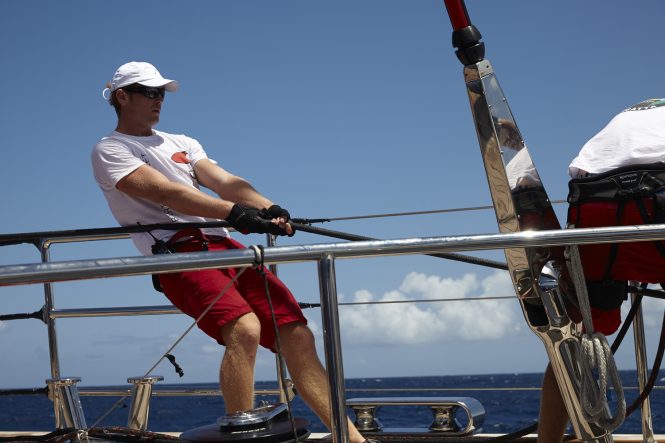
Seahwak’s Crew
Working on a luxury yacht isn’t without its drawbacks, however: Weeks at a time spent away from home, long working hours in the peak seasons and ensuring that everything runs smoothly when you’re far from the port can all take their toll. When performing tasks that can be as equally trying as they are rewarding, crew members want to assure that their pay reflects the professionalism and high degree of detail that they put into each day.
Following the launch of free salary-sharing platform www.yachtingsalaries.com in March 2016, YPI CREW has revealed its first report into the salaries paid to the crew on luxury yachts of various sizes.
Covering the period between 2016/2017, the results not only provide transparency to crew members but help employers to attract and retain individuals with exceptional skills. The occupations covered range from captains to deckhands and compare pay for permanent, private, rotation and charter crew: Find out how the charter industry measures up to the other sectors.
446 captains submitted information to www.yachtingsalaries.com, and the data revealed that 13% worked on sailing yachts and the other 83% on motor yachts. Captains on larger yachts earned more per month than captains of smaller vessels to create an upward trend, although M/Y captains of 35m-51m superyachts fared particularly well, with a jump in salary from €9,000 per month for 41m-50m yachts up to €13,000 p/m for larger luxury yachts. Private and permanent captains tended to earn the most for their size category, with permanent captains coming out slightly ahead.
Sailing yacht captains tended to earn the same as on motor yachts for the 0-35m and 35-40m vessels, earned more than motor yacht captains in the 41-50m category by €2,000 per month, and earned less than motor yacht captains by €2,000 in the 51-65m category.
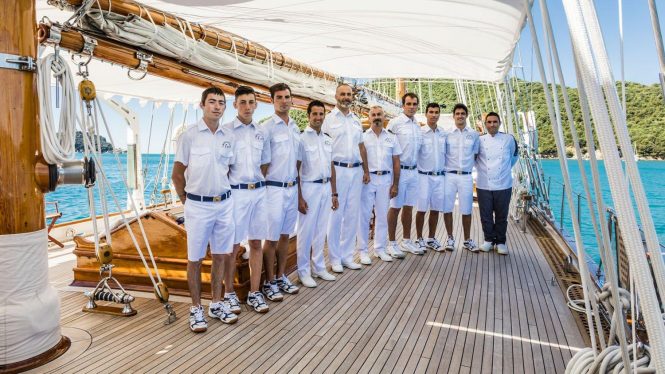
Crew aboard Crose Del Sud
Technical Crew
239 of the 434 technical crew surveyed were chief engineers, and on charter yachts, they earned an excellent salary compared to private, permanent and rotational counterparts on the same-sized yacht: In the 0-35m size category, they earned €6,000 per month compared to €5,500. Salary levelled off in the 80-100m category, with chief engineers on charters earning slightly less than others with a salary of €9,500.
Second engineers were the most stable across the sectors and received a steady pay of between €48,000, rising to €70,000 on the largest yachts. Second engineers on charter yachts were paid considerably more per month than permanent and private second engineers within the 51-65m and 66-80m categories, earning between €5,000-€10,000 more in the former category and €2,000-€5,000 per month more in the latter.
Third engineers earned between €2,500 and €5,000 per month, with the pay scale raising incrementally based on yacht size.
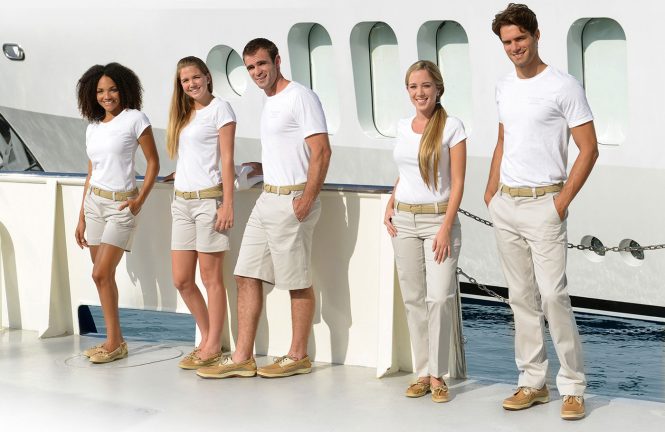
Luxury superyacht crew
Deck officers
69% of the 224 deck officers who took part in the survey were permanent and 31% rotational. Second and third officers had a greater chance of occupying a rotational position (50% and 70%), making deck officers the most likely crew members to have rotational work. Deck officers on charter yachts tended to earn less than counterparts on similarly-sized vessels, and private and permanent positions provide the most stable throughout.
Salaries for chief officers on charter yachts ranged from under €4,000 per month on 0-35m vessels to over €8,000 on 81-100m vessels and dropping slightly in the category of 101+m
Data for 2nd and 3rd officers was more sporadic, and charter position salaries ranged from €3,800 for both positions on yachts 51-65m and upwards.
Although 127 chefs participated in the survey, results were varied both for yacht sizes and sectors, producing the unusual graph where the head chefs on a 0-35m and 66-80m yacht were earning approximately the same (€4,000 per month) while on other sized charter yachts the head chefs were earning between €5,000 and €8,000. Of the head chefs who submitted data. 85% were permanent and 15% on rotation.

Dining aboard superyacht SuRi
Vessel size seemed to play a part in the salary of sous chefs, with each type of employees earning more on larger yachts. 71% were permanent, and 29% were temporary.
Pursers, Stewards and Stewardesses
For the 2016/2017 report, only 27 pursers, 68 chief stewards/stewardesses and 27-second stewards/stewardesses provided information, and there are therefore too few results to make solid conclusions about industry salaries in this area. Of the pursers, salary varies from €5,000 per month to €7,000 and remuneration did not have any correlation with the size of the yacht and salary was stable regardless of the type of employment, although results were the most unstable in the 66-80m category.

Excellent service onboard
Chief stewards and stewardesses received greater salaries for working on larger yachts, with rotation, permanent and private employment having the most stable salaries and charter crew the most variable: salary on a 51-65m superyacht was €6,500 per month, whereas under €6,000 was paid to stewards and stewardesses aboard 66-80m vessels and smaller yachts.
The results of the second stewards and stewardesses had the most variability, with charter and rotation crew earning under €3,000 for 66-80m vessels while private and permanent crew earned €5,000.
Deckhands
Deckhand salaries tended not to vary depending on the size of the vessel, and 93% were permanent and 7% on rotation aboard motor yachts, while sailing yachts had 100%, permanent crew. From the 87 deckhands that contributed to the study, data revealed that salaries tended to range between €2,100 – €3,000 per month, regardless of whether the yacht was a charter, private or permanent. Deckhands on rotation earned €3,000-€9,000 less depending on the size of the yacht.
The website www.yachtingsalaries.com currently has 2,857 searchable salaries and includes other professions such as bosun and helicopter pilot, as well as the full comprehensive report. Results are searchable at any time, and the next report is due in November 2018.
Please contact CharterWorld - the luxury yacht charter specialist - for more on superyacht news item "Superyacht Crew Salaries: First Report Released ".
- Charity & Fund Raising
- CharterWorld News
- Classic Yachts
- Coronavirus
- Cruise Ship
- Ecological Yachts
- Expedition Yachts
- Expert Broker Advice
- Feature Superyachts
- Interior Design
- Legal & VAT Yacht Issues
- Luxury Catamarans
- Luxury Gulet
- Luxury Phinisi
- Luxury Trimarans
- Luxury Yacht Design
- Luxury Yachts
- Marinas & Harbours
- Marine Ecology
- Marine Electronics
- Marine Equipment
- Mega Yachts
- Modern Yachts
- Motor Yachts
- New Launch Yachts
- New To Charter
- Open Style Sports Yachts
- Private Jets
- Sailing Yachts
- Social Media
- Sports Yachts
- Superyacht Crew
- Superyacht Photographers
- Superyacht Products & Supplies
- Superyacht Refits
- Superyacht Reviews
- Superyachts
- Uncategorized
- Yacht Builders
- Yacht Charter
- Yacht Charter Destinations
- Yacht Charter Picks
- Yacht Charter Specials
- Yacht Delivered to Owner
- Yacht Designers
- Yacht Events & Boat Shows
- Yacht Fashion
- Yacht Industry News
- Yacht Photos
- Yacht Racing
- Yacht Racing & Regattas
- Yacht Safety Equipment
- Yacht Support Vessels
- Yacht Tenders
- Yacht Videos
- Yachting Associations
- Yachting Awards
- Yachting Business
- Yachts For Charter
- Yachts For Sale
Quick Enquiry
Superyacht news:.
Email Your Yachting News to: news @ charterworld.com

Viking Recruitment expands and moves office
The 2010 Genoa Charter Yacht Show Starts Tomorrow and Features Superyacht ICON 62, TRIDENT, BISTANGO and CLOUD NINE
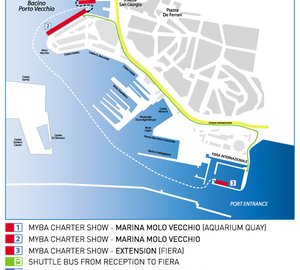
2011 MYBA Genoa Yacht Charter Show expands with extra dockage

Inaugural Superyacht Captains Forum in Auckland a success – Superyacht Captains enjoy Pacific tour
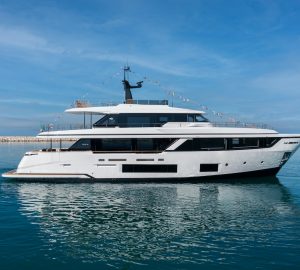
Ferretti Custom Line Navetta 30 series motor yacht GINDUNGO hits water in Italy
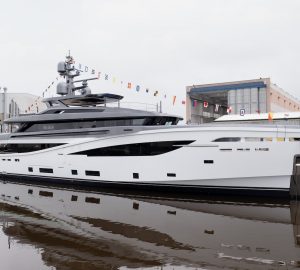
50m luxury motor yacht BEL1 launched in Pisa by Rossinavi
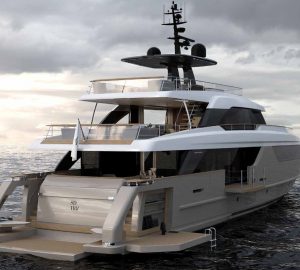
Luxury yacht UNIQUE S is brand new to the charter market in the Western Mediterranean
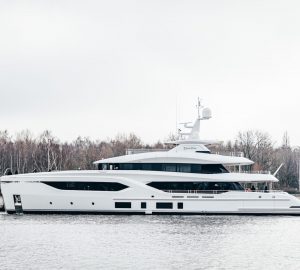
44m superyacht EXTRA TIME new to charter around the Western Mediterranean

Baglietto announces the launch of 41m luxury yacht ASTERA
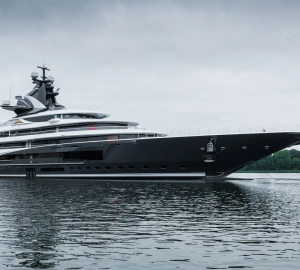
Superyacht KISMET – the 122m Lurssen motor yacht the charter market has been waiting for

Another great special offer on board 36m motor yacht CALYPSO I
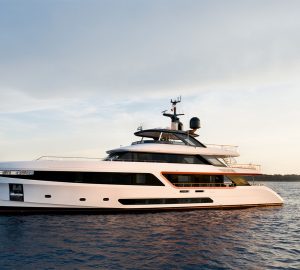
37m luxury yacht LEGEND offering unparalleled comfort on charters in the Western Mediterranean
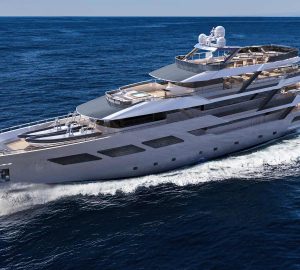
Discover our Top 10 brand new yachts available for charter worldwide this year
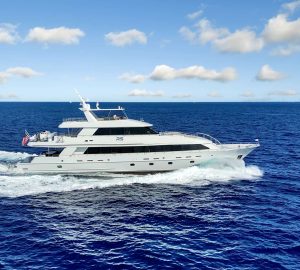
Florida charter yacht REAL SUMMERTIME offering 10% discount
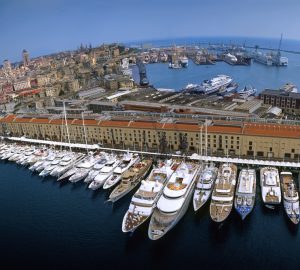
Looking ahead to the 2024 MYBA Charter Show in Genoa
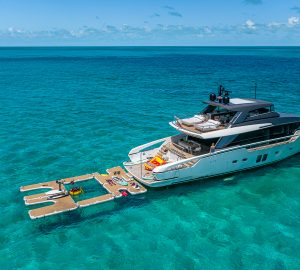
Discover summer in New England aboard a luxury charter yacht: Escape to this beautiful northeast corner of the USA
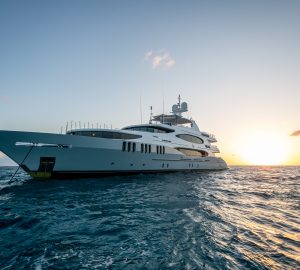
Last minute yacht charter deals in the Bahamas

Westport announce the first hull of their 36m W117 range is nearing completion

49m sailing yacht ANIMA MARIS is offering discounted rates for the remaining summer weeks in Croatia
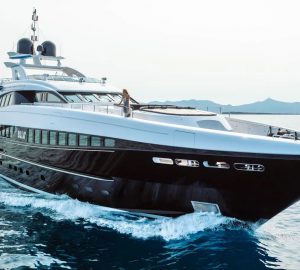
3rd Engineer for 80m Private Motor Yacht (USA)
Sea Daine Recruitment
Opening Date
3rd engineer
Description
3rd Engineer – 80m M/Y Private – Start Date open - Joining in the US - Salary 4000 - 4500 Euro, negotiable based on experience, with 60 days leave. “Minimum” AEC, previous experience can be shore based, or from your last yacht contract. A trade background or interest in AV/IT is also beneficial. You will be joining an established engineering team, who work very well together. This role comes with good leadership and career progression, the current 3rd engineer is leaving on good terms and will provide a full handover. Qualifications: AEC, STCW, ENG1 - B1/B2 (assistance given if required)
More vacancies for 3rd engineer
3rd Engineer for Mega Yacht
KJCM Maritime Corporation
MEGA YACHT MARCH DEPLOYMENT NEED YACHT OR PASSENGER EXPERIENCE 3RD...
MEGA YACHT MARCH DEPLOYMENT NEED YACHT OR PASSENGER EXPERIENCE 3RD ENGINEER * Knows how to...
4x 3rd Engineer for Cruise Liner
Columbia Aurus Ship Management
We are looking for below rank with experience on Cruise Vessel Third...
We are looking for below rank with experience on Cruise Vessel Third Engineer - 4 Nos...
3rd Engineer on Freight Ro-Ro Vessel (North Sea)
Clyde Marine Recruitment
Third Engineer required to join Freight RoRo vessel Date of joining...
Third Engineer required to join Freight RoRo vessel Date of joining: 26.03.2024 Rotation: 6...
3rd Engineer for Ro-Pax Vessel
Polaris Maritime Services Baltic
We are currently seeking an experienced 3rd Engineer for a ropax vessel...
We are currently seeking an experienced 3rd Engineer for a ropax vessel. Position: 3rd Engineer...
Injured on Board? Get help here!

JOIN OUR COMMUNITIES:

You can contribute to this table by filling the form on the bottom of the page. All submissions are anonymous !
Here you have access to all positions available on board cruise ships, sorted by the position title, the company and the salary per month with the currency of the company. These are values set on the contract as the base salary and not final, as they do not account for eventual tips, gratuities or any kind of commission . You’re able to search the position you want and/or the company in order to fully compare each other.
If you enjoyed this feature, please share with your colleagues and help us improve by filling out the form. We often get asked “how updated is the table?” and the anwser is: We receive around 20 reports a day. If you see that a salary is wrong, you know what to do, fill the form!
All submissions are anonymous.
We do not share any data with agencies or companies..
Vacancies for 3rd Engineers
L-Stream Ltd
Akmar Transport LTD
SEAGEN GROUP NOVO
Universal Service Crewing Agency
Tenet Marine Company
Bernhard Schulte Shipmanagement
Ocean Marine Thrive Agency
Amber Maritime Ltd
AKMAR TRANSPORT LTD
Evromarine Service Ltd
SSMA Arabian (Private) Limited
All Crew LLC
EUROCREW Manning Agency
SEA STAR CREWING AGENCY
Baltic International Marine Services
Elvictor Group
Job categories
- Deck Officers 8429 jobs
- Engine Officers 10088 jobs
- Engine Ratings 1413 jobs
- Electricians 1663 jobs
- Deck Ratings 1740 jobs
- Catering Staff 769 jobs
- Offshore 4460 jobs
- Cadets 189 jobs
- Full crew 1389 jobs
- Tanker fleet 1252 jobs
- Oil and Gas 1048 jobs
- Onshore 576 jobs
- Passenger and Cruise 815 jobs
- Yachts jobs 201 jobs
- Companies jobs 7878 jobs
- Careers 418 jobs
- Maritime Security 34 jobs

Job Information
Job sector:.
- Engineering
- €3,200 Per Month
Job Industry:
Job location:, 3rd engineer.
Rotational 3rd engineer required AEC as minimum, STCW, ENG 1, Discharge book, PDSD,
Get in touch
- [email protected]
- +44 7480 400115
© 2024 All rights reserved
Privacy Overview

IMAGES
VIDEO
COMMENTS
As a Yacht Engineer, I make an average base salary of $90,854 per Year in the US. Finger out salary benefits for Yacht Engineer. ... The second and third states are California and New Jersey respectively. The high or low salary paid to Yacht Engineer by the US has a greater relationship with the demand for jobs and the cost of living.
Above 50m, the Chief Engineer contracts are generally Rotational. The breakdown of their salary per month is below: On yachts above 50m, crew may be offered Permanent Second Engineer or Rotational Second Engineers contracts. The average monthly salary for yachts from 50-90m for Permanent Second Engineers is as follows:
The estimated total pay for a Yacht Engineer is $98,612 per year in the United States area, with an average salary of $88,459 per year. These numbers represent the median, which is the midpoint of the ranges from our proprietary Total Pay Estimate model and based on salaries collected from our users. The estimated additional pay is $10,152 per ...
Discover the ultimate yacht crew salary guide at YPI CREW. Get insights into competitive salaries for yacht crew members worldwide. Plan your career today! ... Third Engineer: For 70m — 80m the salary is based on the candidates holding a AEC. For 80m — 100m the salary is based on the candidates holding an EOOW - equal rotation or 4:2 for ...
For example, a hybrid job description may read "3rd Engineer/Steward" and describe a role in engineering when the boat is empty but on inside crew when passengers are on board. ... Reports to: The yacht owner. Salary Range: $6,000 to $22,000. Deck.
The salary of a Third Engineer can vary significantly, typically ranging from 4000 to 7000 USD per month. This largely depends on factors such as the type of ship, the company, the nationality of the seafarer, seniority in rank, and the country that issued their CoC. ... The position of a Third Engineer rarely exists on yachts, except for ...
There are two common routes for becoming a superyacht engineer. Firstly, you can enroll in the courses set out by the Maritime and Coastguard Agency (MCA) and work your way through them from the bottom up. These include the Approved Engine Course (AEC), the Marine Engine Operator License (MEOL), and the Yacht 4, 3, 2 and 1 qualifications (with ...
What is a typical yacht engineer salary? Starting out as a 3rd or junior engineer, you can expect to earn anywhere from $3,000 to $6,500 per month, and as you move up the ranks to 2nd engineer this increases from $5,000 to $8,000. In the top position, a chief yacht engineer salary can be anywhere between $8,500 to $13,500, depending on the size ...
Engineer 40M. We have an opening on a 40M Charter yacht FL / Bahamas based. At the moment the position is full... March 14, 2024 - Fort Lauderdale, Florida. Page 1 of 2. 1. 2. Next. View current job vacancies for a 3rd Engineer on-board yachts, superyachts and megayachts.
The average YACHT ENGINEER SALARY in the United States as of March 2024 is $46.06 an hour or $95,796 per year. Get paid what you're worth! Skip to ... CA, with San Francisco, CA and Marysville, WA close behind in the second and third positions. Marysville, WA beats the national average by $19,412 (20.3%), and Santa Clara, CA furthers that trend ...
There are rankings within the interior (2nd, 3rd, 4th Steward/Stewardesses). As you spend more time in the industry, you will be promoted to higher ranks, and with that will come a better salary and more responsibility. ... Engineer Yacht Salary. 20m-30m: $4000-$5000; 30m-40m: $4500-$6500; 40m-50m: $6000-$8000; 50m-70m: $7500-$11000; 70m+: $9000+
The estimated total pay for a Third Engineer is $170,834 per year in the United States area, with an average salary of $125,510 per year. These numbers represent the median, which is the midpoint of the ranges from our proprietary Total Pay Estimate model and based on salaries collected from our users. The estimated additional pay is $45,324 ...
YACHT ENGINEER SALARIES. Yacht engineer salaries vary, depending on the size and types of yacht. Data indicates that working on a charter yacht can see a yacht engineer earn more than on a private yacht, but the role of chief engineer earns more on a private yacht in turn. A chief yacht engineer salary on a 66m yacht starts around €5,000, but ...
Find out how much yacht crew earns. See the full report and median salary ranges for each of the yacht roles.
Third engineers earned between €2,500 and €5,000 per month, with the pay scale raising incrementally based on yacht size. ... salary varies from €5,000 per month to €7,000 and remuneration did not have any correlation with the size of the yacht and salary was stable regardless of the type of employment, although results were the most ...
3rd Engineer for private 70m+ Motor Yacht in North America. Skilled 3rd Engineer working in a 3:1 rotation required for 70m+ Private Motor Yacht. The successful candidate will have experience working with tenders and smaller vessels as well as a commercial EOOW Unlimited CoC, or Y4 minimum. ... Salary : DoE Circa $4000. Start : January. Please ...
We are seeking skilled and committed 1st Engineer Assistant specializing in mechanical systems (1st Engineer, 2nd Engineer, 3rd Engineer) for designated vessels, including diverse pontoons, for a project in Europe within the maritime sector. The starting date is the 15th of January for a 4-week rotation.
3rd engineer. Description. 3rd Engineer - 80m M/Y Private - Start Date open - Joining in the US - Salary 4000 - 4500 Euro, negotiable based on experience, with 60 days leave. "Minimum" AEC, previous experience can be shore based, or from your last yacht contract. A trade background or interest in AV/IT is also beneficial.
What's the average of salaries between cruise companies? Here you have a full salary comparison to check! How much money the crew on the cruise makes? What's the average of salaries between cruise companies? ... Ritz-Carlton Yacht Collection: 1870: USD: Assistant Stateroom Steward / Ass. Cabin Steward / Ass. Suite Attendant ... 3rd Engineer ...
Open vacancies for Third Engineers (3rd Engineers). Best condition of work. ... 3rd Engineer with salary 141 000 RUB per month for General Cargo. All Crew LLC. Third Engineer for LNG with salary 7350 USD. ... Yachts jobs 201 jobs; Companies jobs 7878 jobs; Careers 418 jobs; Maritime Security 34 jobs;
Our clients are seeking a 3rd engineer for a rotational position on a 70m classic motor yacht. This offers a great opportunity for those wishing to cross over from a commercial background into the yachting industry. Certificates required: AEC 1&2 as minimum, preferably EOOW. STCW, ENG 1, Discharge book, PDSD - Start 4th May Opportunity to work on a unique classic motor yacht running original ...